#thing entirely to leave him physically vulnerable without any real idea of how to defend himself???
Explore tagged Tumblr posts
Text
if you were raising the prince of your kingdom in secret would you not want him to at least be able to defend himself when he inevitably had to return to said kingdom like why wouldn't you get him into some self defence classes at the very least
#vic.txt#the next prince#it's ANNOYING me that his dad had 20+ years to prepare him for this and didn't#like it's one thing not to tell him who he actually is - and that's shitty in itself as we are seeing in the show - but it's another#thing entirely to leave him physically vulnerable without any real idea of how to defend himself???#like surely you must have at least entertained the idea his return would be dangerous after. you know. the reason you're raising him
11 notes
·
View notes
Text
To Look On Tempests and Not Be Shaken
Summary: In the wake of a blazing row and an empty apartment, Aaron finds Spencer's well-thumbed copy of Shakespeare's sonnets and recalls the morning after their wedding, when Spencer sat on his lap and read Sonnet 116 to him. Suddenly, everything makes sense.
Tags: angst with a happy ending, fighting and making up, married hotchreid, relationship dynamics, introspection, fluff, shakespeare/literature
Pairing: Aaron Hotchner x Spencer Reid
Word Count: 2.6k
Masterlist // Read on AO3
(Set in S11, AU in which Haley/Aaron divorced in S1 and Aaron/Spencer married in S4.)
It wasn’t really either of their faults: work was relentless at the moment and they hadn’t had any real time for one another in weeks. That’s not really a consolation to either Spencer or Aaron, however, when they’re in the middle of a blazing row that has them both drowning in flames of anger and passion, unable to see one another for the smoke filling their apartment.
“Aaron, this is the fourth case in a row that you’ve stayed at the office past 4 in the morning to wrap up the paperwork,” Spencer shouts, frustration rising in his chest as he tugs at his hair, already feeling far too overwhelmed. Aaron is looking as unbothered and stoic as he always does during their fights, and even though Spencer is fully aware of the emotion that will be stirring under his carefully constructed mask, it doesn’t make it any less exasperating.
“You know as well as I do that this sort of work load is completely unavoidable,” Aaron says lowly, anger finally audible in his voice. It’s not as satisfying as Spencer had hoped. “We can’t keep rehashing this same old argument. I’m the Unit Chief of a team in one of the most prestigious FBI departments. I have a responsibility.”
“You have a responsibility to me and Jack as well,” Spencer cries, fury bubbling over as he thinks of Jack and just how much he deserves. “We deserve your time just as much as fucking serial killers do.”
Aaron visibly flinches as Spencer swears, an occurrence rare enough to indicate serious emotion. “This is exactly the argument I used to have with Haley, Spencer,” he says harshly. “I refuse to have it with you, too. If you can’t handle it then maybe you should leave, just like she did, hm?”
“Have you ever stopped to consider that maybe that means there’s an element of truth in it then, Aaron?” Spencer asks, voice breaking slightly as the scale tips away from uncontained ire towards hopeless misery. He turns away from his husband, trying in vain to conceal his crumpled face and damp eyes. “And you know I would never do that to you; don’t you dare throw your unresolved issues back in my face.”
“I can’t deal with this right now,” Aaron says, voice and face hardened; Spencer can almost see the walls he’s building up again, the stubborn refusal to concede any point. “You’re not being rational. I’m going to bed.”
His stomach twists with the desperation of the situation as he says quietly to Aaron’s turned, retreating back, “What happened to never going to bed angry?” He doesn’t turn back around.
⭐️
Aaron waits in bed for Spencer to join him, fully intending to feign sleep the moment he enters the bedroom but nevertheless longing to know he’s safely tucked next to him in bed. When he hears the quiet click of the front door and checks the time to see he’s been waiting for almost 25 minutes, though, a panicked feeling fills his chest. He throws the covers back and treads out to the living room, only to be met with a decidedly empty room. If he was a more spiritual man he’d say he could still feel the angry aura of their previous argument lingering over the furniture. Really what he feels is the inevitable, empty vacuum a home without Spencer in it is bound to house.
He sits down on the sofa, just on the wrong side of too cold in his threadbare t-shirt and underwear, and buries his head in his hands. The problem is that he knows Spencer’s right. He and Jack both deserve better than this kind of life, of course they do. Jack deserves a father, Spencer deserves a husband. Admitting such a fact, however, requires humility, vulnerability, failure almost. It means telling his boss that he needs reinforcements, that he can’t continue with the 80+ hour weeks, that he’s not as strong as he used to be.
That sort of thing takes a courage that feels so far out of reach, though, and he’s left defending a place he doesn’t want to be in against people he loves more than anything in the world.
Forcing himself out of his miserable carousel of thoughts and regrets, he pulls his head from his hands and catches sight of a note on the coffee table, his name scrawled across it in Spencer’s handwriting. Immediately, his heart sinks: it’s unlikely a love letter. It’s far more likely it’s a note of good riddance, an announcement of abandonment.
Turning it over in his shaking hands, he reads:
I’ve gone to stay with Derek and Penelope for the night. I will pick up Jack from Jessica’s in the morning, on my way home. I love you. Spencer
He immediately feels guilt at ever having thought that Spencer would be cruel enough to leave him in the same way he’s been left himself one too many times. His husband has an incredible amount of love filling his heart, and he’s simply incapable of such cruelty. It’s been a fear of his for many years, that Spencer would grow unhappy but be too kind to leave, prioritising Aaron above himself. He knows it’s Haley’s fault for embedding such fear and doubt in his heart all those years ago, but he can’t help but berate himself for ever doubting Spencer.
It’s not like they’re about to break up. When he considers the situation logically, he knows that. He loves Spencer, Spencer loves him, and ultimately, he’s going to relent. He’s going to draw on whatever shreds of courage remain in his tattered and beaten soul and do whatever it takes to make his family happy, to give them what they deserve. He just has no idea how to cross the gaping chasm that stands in the way of reaching that eventuality.
He goes to place the note back down on the coffee table, but his eyes land on the book it had originally rested on: Spencer’s well-loved copy of Shakespeare’s sonnets. He picks it up, sort of absent-mindedly, thumbing the pages the love of his life has read countless times, holding on to the book as an emotional connection to Spencer. It’s travelled their entire relationship with them; he remembers it laying on his spare bedside table back when Spencer visited his apartment in the dead of night, terrified of anyone finding them out. He’d read the poems over and over again, long into the night. Aaron can’t help but smile at the memory of Spencer’s unique quirks.
Eventually, his absent fiddling lands him on a page Spencer’s visited time and time again. A worn leather bookmark Aaron recognises as one of Diana’s gifts marks the page titled Sonnet 116. Tired and lovelorn, he begins reading.
Let me not to the marriage of true minds Admit impediments. Love is not love Which alters when it alteration finds, Or bends with the remover to remove. O no! it is an ever-fixed mark That looks on tempests and is never shaken; It is the star to every wand'ring bark, Whose worth's unknown, although his height be taken. Love's not Time's fool, though rosy lips and cheeks Within his bending sickle's compass come; Love alters not with his brief hours and weeks, But bears it out even to the edge of doom. If this be error and upon me prov'd, I never writ, nor no man ever lov'd. Sonnet 116, William Shakespeare
((Modern Translation, if you’d prefer:
I will not admit that interferences are possible in the union of two people In love. Love that changes when circumstances do is not love, Nor if it bends when someone tries to destroy it: Oh no! It is an eternally fixed point, Which may watch storms but is never shaken by them; it is the guiding star for ever lost ship: Its distance may be measured but its quality cannot be. Love does not fall victim to Time, though features of youth Are eventually entrapped by him; Love doesn’t change as hours and weeks race past, But endures until death. If this is wrong, and I’m proved incorrect, Then I never wrote, and no man ever loved.))
The words come rushing back to him as soon as he reads them: it had been a contender for Spencer’s chosen poem at their wedding. He’d eventually gone with I loved you first by Christina Rosetti, the perfect compliment to his own choice of I love you by Ella Wheeler Wilcox, but on their first morning as a married couple, laid in their warm and comfortable bed, Spencer had pulled out this very book and straddled Aaron’s thighs, reading it to him with an earnest expression. He remembers the air being punched out of his chest as he’d looked up at a bright-eyed 27-year-old Spencer who had been through so much already but still held all the grace and innocence he did on his first day at the BAU.
He doesn’t realise he’s crying until a tear runs down his nose and splashes on the page. What really tips him over the edge is reading Spencer’s small, chicken-scratch annotations around the poem, noting different points in their relationship, events between the two of them that prove the words of an Englishman born 400 years earlier.
It’s so easy for him to doubt how much Spencer loves him - insecurities and the trauma of his separation from Haley consume him far too often - but he’s holding the tangible, physical proof. This is undeniable, this is the evidence his doubtful, damaged heart yearns for, and the furious, raging, endlessly tumultuous waters inside him settle for the first time in weeks.
⭐️
The second Aaron’s alarm goes off at 6am, he gets started on the plan he’d formed as soon as the words of Shakespeare’s sonnet had sunk in. The email he’d composed the night before is the first thing his laptop screen displays when he powers it on, and he presses send on the uncompromising, demanding letter he’d addressed to Cruz. Finally feeling good about the entire situation, he turns the coffee maker on and gets dressed; Spencer’s an early riser but he’s determined to get to Derek and Penelope’s before he leaves.
The relief is freeing, and he feels light for the first time in a long time. He hadn’t quite realised just how much it had all been weighing on him until he’d finally found the courage to cut it free.
Armed with two coffees and Shakespeare’s sonnets, he heads downstairs to the taxi he’d ordered the night before. The city races past in front of the slow and steady sunrise, dawn marking a new chapter in Aaron’s life that he’s determined to make worth it. Slowly the thick of the city fades into the suburbs, and the taxi slows down as they wind through the maze of identical looking streets until they arrive at Derek and Penelope’s home.
He pays the taxi driver as quickly as possible and sighs in relief at the sight of Spencer’s car still on the drive as he climbs out of the vehicle, carefully balancing his two coffees, still warm in their thermal mugs. Fully aware that Derek and Penelope are absolutely going to chew him out the minute they lay eyes on him, he hesitantly rings the doorbell.
“Man, what the hell?” Derek exclaims, clearly exasperated as he swings the door open, revealing a sorry looking Aaron Hotchner standing sheepishly on his doorstep.
“I know,” Aaron replies immediately, trying to portray as much regret and understanding with his body language as is possible when holding two coffees with your husband’s most prized possession perched precariously under your arm. “I know, I fucked up, and I’m sorry. I need to see Spencer.”
Derek looks thoroughly put out just being in Aaron’s presence, but after a moment or two of hesitation he relents, opening the door wider to let him through. “Alright,” he sighs. “I’ll ask if he’s okay to see you.”
He parks Aaron in the living room and then leaves to go and find Spencer. Only seconds later, he hears the hurried click of kitten heels on the wooden floor and internally cringes; if facing Derek was bad, facing Penelope will be infinitely more painful.
“Aaron Hotchner,” Penelope shouts before she’s even fully entered the living room, “I have never, and I mean never been more disappointed in you. I don’t think you fully appreciate how lucky you are. You may be my boss but that does not mean I will not chew you out when you screw up this bad. Anyone who makes my Spencer cry is in my bad books for at least two weeks. You are in the dog house, you understand me? The dog house.”
She’s thankfully cut off from continuing her rant by Spencer’s shy, hesitant appearance at the doorway. Penelope immediately rushes over and gives him a hug, whispering something in his ear that Aaron doesn’t catch but makes Spencer giggle. She reaches up to ruffle his hair before patting his cheek fondly and casting a furious glare in Aaron’s direction as she vacates the living room.
“Hi,” Aaron says softly, breaking the silence left in the wake of Storm Penelope. “I bought you a coffee.”
“What are you doing here, Aaron?” Spencer asks, clearly a little confused but still accepting the drink.
“I know you said that you’d come home this morning but I had to come and get you,” he replies, standing up from his seat on the couch and taking a few steps forward. “Look… your note last night, it was on top of this book. And in my absent-minded cloud of misery I was looking through it and came across Sonnet 116.”
A flicker of recognition lights up Spencer’s eyes as his face softens a little at the sight of his beloved book.
“Do you remember? Climbing into my lap on our one day wedding anniversary and reading it to me? Back then I was partly distracted by the gorgeous man in my arms but last night… Spencer, the words hit home in a way I haven’t felt before. Not to mention your annotations; I felt like I was reading a journal of our love story, which I know was probably your intention all along.” He shakes his head, trying to get back on track. “I’ve been an idiot, a rotten fool, and I’m so sorry. I emailed Cruz this morning.
“You did?” Spencer looks up, surprise filling his features for a second before a small, hopeful smile takes over. “What did you say?”
“That I couldn’t continue with the workload and I needed reinforcements. That I would work the same hours for two more weeks to allow them to find an adequate solution, but after that I’ll be reducing my hours to align almost directly with yours,” he says, tentatively gauging Spencer’s reaction.
It’s made pretty easy for him when Spencer’s hesitantly hopeful smile blossoms into a wide grin, relaxing his posture as relief overtakes his body and he throws himself into Aaron’s arms. Aaron buries his face into his husband’s curls and lets himself breathe easy, feeling infinitely better with Spencer wrapped up in his arms again, just where he belongs.
“I’m so sorry, baby,” Aaron whispers as he pulls Spencer impossibly closer.
“I’m sorry, too,” Spencer sighs, nestling his face further into Aaron’s neck. “We both said things we shouldn’t have. But, you’re here now, and that’s what counts.”
“I love you, you know that?” Aaron murmurs, pulling away slightly so he can look Spencer in the eyes, trying to convey his sincerity as well as possible.
“I know,” he smiles. “I love you, too.”
“Come on, sweetheart,” Aaron says, patting Spencer’s side gently. “Let’s get out of here before Penelope comes to stab me with her high heels.”
Spencer giggles at that. “I don’t know, maybe, I’d like to see that,” he teases, digging his finger into Aaron’s ribs for good measure.
“Oh, stop it you,” Aaron smiles fondly before kissing the top of Spencer’s head, feeling happier in this moment than he’d ever thought possible again last night. Peace is finally restored in Aaron Hotchner’s heart, all thanks to one rather ancient English playwright and an academic for a husband. “Let’s go and get Jack,” he says, longing to have his whole family back together, to restore the equilibrium of a tumultuous few weeks.
Spencer leans down to kiss his shoulder as they walk out of the Morgan-Garcia household, and it’s enough to keep him warm the whole way home.
@strippersenseii @criminalmindsvibez
#hotchreid#my writing#hotchreid fic#hotchreid writing#criminal minds#criminal minds fic#aaron hotchner#spencer reid#aaron hotchner/spencer reid#aaron hotchner x spencer reid
66 notes
·
View notes
Text
Why did Jeremiah want Ecco dead, and how did he pull it off?
It is my solid belief that Jeremiah wanted Ecco to die, and I have several reasons why. It starts when he was sprayed, however back then it was more of an indifference to if she died or not. If you think about what he made her do, he made her shoot herself, he put her in the bunker to keep Jim there with the chance that it could blow up with her still in it, he almost definitely made her be the one to converse with all the dangerous gangs and criminals to exert his dominance over them. All were high risk situations where she could have died, but there was always a chance that she wouldn’t. We know that a lot of Jeremiah’s relationships were fuelled by obsessions, but I don’t think he was obsessed with Ecco as a person, I think he was obsessed with the fact that he had been able to manipulate a person so well into being entirely devoted to him and changing their personality and manner, and Ecco was just the walking embodiment of that. Alongside her being useful due to this, by keeping her around he was constantly reminding himself of his achievement in making her who she was. He saw her as a possession of his own creation, but as he was just obsessed with that and not actually Ecco herself, she was expendable, but precious enough to allow a chance at living.
Which means that something changed between 5x07 and 5x12 in that ten years, something that changed Jeremiah from not caring if she died, to wanting her to die. That difference is evident in the finale, because if he didn’t actively wish for her to die, I imagine that he would have just left her dying with the stab wound, rather than ensuring that she would definitely die. There was a chance that she could have survived, I don’t know tons about stab wounds but people in Gotham have survived much worse injuries, Jeremiah has survived much worse injuries. But for once he didn’t allow her to have that chance.
This brings us to the ultimate question: why would Jeremiah want Ecco dead? She was loyal, he knew that she would do what he wanted, and he had his own personal protection wherever he meant. Clearly, the big event linking this change was the 10 years he spent in Arkham. Obviously we don’t see much of them there, but we see enough to establish that Ecco was his nurse and the person he solely relied upon, he used her to get information in and out and as far as we know, for a very large chunk of that 10 years she was the only person who knew he wasn’t braindead. Now, that has some very striking similarities to the role she played when she was his proxy, as back then he was reliant upon her to do so much, without her being able to leave the bunker he would have struggled a lot more. He was very dependent upon her, and at that point, I don’t think he minded. However, when he got sprayed and certain elements of his personality were intensified, the arrogance and self-obsession did as well, and he no longer wanted to be dependent upon someone, he believed himself to be the most important person that doesn’t need to answer to anyone. He brainwashed Ecco to flip it around, she was now the one dependent on him, and he had the full power.
When he went to Arkham, he no longer had that control over her. Ecco had no guidance, and automatically switched back into the role that she was most comfortable doing: looking after him. We don’t know how long Jeremiah was pretending to be brain dead, but when he woke up, he had to start pretending straight away. There was no way he could have done it without Ecco. Once again, their roles had been reversed and he was once again solely relying upon Ecco to look after him, to carry out everything he needed done, and to make sure he wasn’t discovered. He must have resented the fact that she could do everything he wanted to do, all his anger about having to wait for the right moment was now being channelled into his relationship with her, because that was the only real relationship he had at that moment in time. Unlike before, he no longer had an outlet for his anger. He couldn’t move, the only thing he could do was think. That would be enough to drive you further into madness, and to warp feelings towards someone else into negative emotions because that’s all you know. If Ecco brought him any messages from the outside, for example the news that Bruce had left Gotham, he couldn’t see them to develop hatred towards them, and so he does towards the nearest person at the time, which is Ecco. The resentment that he was dependent on her once more, the mixed messages in his brain from madness and the anger he felt for others all manifested itself into him beginning to develop very negative emotions when she was around.
But when does the line between disliking someone and wanting someone dead get crossed? For me, there’s two main reasons, and the first goes back to the point that she was acting very similar to her proxy phase. Not only was it echoed in actions, it was also similar in terms of her movement, body language, facial expressions, and appearance. She is quiet, stoic, she delivers her actions swiftly and with no theatrics. Sure, she had to blend in, but she didn’t need to when she killed the two men in Jeremiah’s cell.
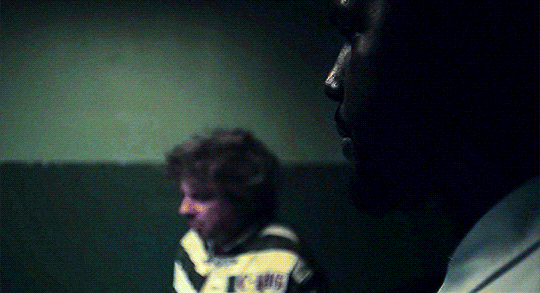
That reminded me of the scene where Jeremiah gets her to shoot the two guards, she does it with no hesitation, silently, deadly. Without the constant influence of Jeremiah being able to control her with words and actions, the façade he built up for her is ebbing away, and surfacing is the Ecco that was always still there, just hidden under the many layers of devotion that Jeremiah had built up. It’s not a quick process, she still has the same voice and wording as she does before, but she’s definitely changed from the person she was in 5x07. Note how she’s still in Arkham when I say this, because the rapid change in her between Arkham and Barbara’s club is important and I’ll get to that later. Essentially, what Jeremiah is seeing before him is all his work that he put in to manipulating her is fading away, that his power over her is no longer as strong as it was. Which makes him question: if it’s happened once, what’s to say it won’t happen again if he manages to brainwash her again? It’s bad enough letting people know that her manipulation wasn’t strong enough to hold when he wasn’t there to constantly enforce it, but for it to fail a second time? He could not allow it. The only solution for him to protect his status and for her to not break free from him, was for her to die.
Furthermore, her acting like his proxy again would have really brought him back to who he was the last time she acted like this, the man that had to fight so hard against his true nature that it made him ‘weak’. He did not want to be that person again, being terrified of his brother, hiding away for years because he couldn’t face the world. Ecco was a constant reminder of that, and I do think that he decided that Ecco was a very strong link between his past and present self, and the only way that the link would be severed would be for her to go away completely. Maybe that is what he tried to do initially instead of killing her, to make her into a different person with a new appearance that wouldn’t remind him of the labyrinth every time he looked at her, but he realised that it really was only a temporary fix and the only way to truly cut off his past was to destroy it. That’s what he did with the labyrinth itself, and it seems fitting to him to destroy all parts of it, including Ecco.
The second reason does have links to the first, and it is his vulnerability inside of Arkham. He pretty much had to be guided with Ecco, she was his ears, his eyes and his legs outside and inside Arkham. He had to let her, there was no other way that it could have worked to the extent that it did. He isn’t able to defend himself with words or physically, but also cannot do anything for himself, he can’t wash himself, dress himself, feed himself etc without dropping his act. The person who is seeing this helplessness first-hand constantly is Ecco. Jeremiah canonically sees himself as this godly figure, one who is all-powerful, who people look up to. To him, being vulnerable is not an option. Being helpless is unthinkable. How could he ever allow someone who saw him in that state live? He may not be able to forget, but he could get rid of any reminders, and also eliminates the idea that people would see Ecco and recognise her as the person who kept him alive, he can’t have anyone on the same level as him, he is alone in his own hierarchy and it must remain that way.
So, that’s pretty much the reasoning behind why I think Jeremiah wanted Ecco dead. Which led me to think how did he manage to pull it off, how did he manage to kill someone who was very smart, a great fighter, and had escaped many dangerous situations before? This leads us back to that sudden switch between Ecco killing the guards and Ecco who is the bait for Barbara. Right, we know that Ecco is more ditzy and less collected when she’s in that state of mind, but examining her behaviour in the scene when she holds the knife to Barbara’s throat, she’s even more off, she’s not focusing on anything, she just seems a lot more relaxed which is such a major difference to how she was in Arkham that it seems too different to be true. I think it is, I think Jeremiah drugged her. He has the access, being in Arkham, and if he asked for it, Ecco would get it for him. I don’t know specifics about medicinal drugs but I imagine that getting something with relaxing properties isn’t exactly uncommon for Arkham, where they need to keep their residents as calm as possible. All he needed to do was get it into her system, Francesca has said that the deleted scene in Arkham involved Jeremiah pulling her into his lap from grabbing her face, kissing her and then carrying her out in his arms. My theory is that he did that as a distraction as he didn’t know how this changing Ecco would react to him trying to inject her, so it would have been easy to inject her when she was distracted and in that close proximity.
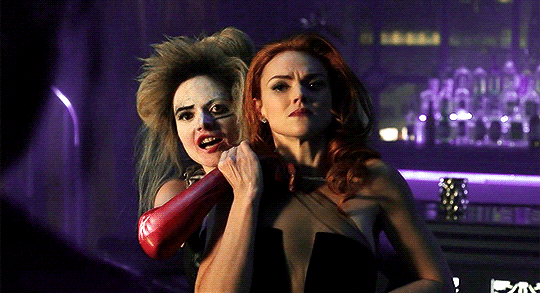
Not only would drugging her affect her reflexes, lengthening them and making her more vulnerable to attack, but he also armed her with a knife. We have seen Ecco use a knife before, but we know that she’s much more comfortable with a gun as that is the weapon we see her with the most, and holding someone at gunpoint is going to be a harder situation for the person to get out of, as one movement and bang, you’re dead. With a knife it requires more force and will take longer, even if it is held at the throat. Jeremiah knows Barbara is a skilled fighter, he’s met her twice before and seen her fight, he would have known that she would have been able to disarm a weakened Ecco and stab her. Which is also why he doesn’t make any attempt to restrain her, the only thing stopping her from disarming Ecco is Ecco’s hold on her, which wouldn’t have been that strong if she were drugged and easily distracted. If he really wanted to ensure Ecco’s safety, he could have binded her, or given Ecco a gun, or even shot her in the leg straight away. But he didn’t, and everything worked out like he thought it would. Barbara broke free, Ecco was too slow to fight back, and she was stabbed. Something that would look like an accident to her, but it was completely planned.
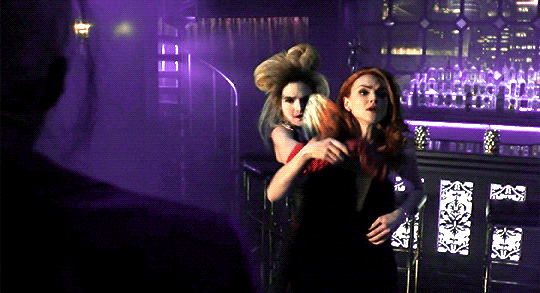
(note how Jeremiah waited until after Ecco was disarmed to turn around)
It’s clever, yes it is clever, but it’s the cruellest thing to do to a person that has devoted their entire life to you. Making it so that she was completely defenceless so she didn’t even have a chance to protect herself. This is why I don’t follow the theory that he shot her out of mercy, he shot her to finish the job that he had set out to do a long, long time ago.
#so i sent this to Kat a while back and finally got the courage to post it#idk why i was worried about this but i have thought about this a LOT#and this is just my opinion on the matter#and plus i made gifs#don't steal them#i'm also going to sleep now but i would like to hear your thoughts#do you think it was an act of mercy or do you think he wanted her to die?#i think my opinion's pretty clear lmao#gotham#ecco#jeremiah valeska
42 notes
·
View notes
Text
Discord prompt pain lvl 7
He didn’t have a heat for a couple months and his pills made him sick, so Dabi stops taking them. Magne looks at him with worry when he’s sick in the morning and he can't reassure her. Tell her that he can’t be pregnant, he’s always been too thin, too sick but since he joined the League that’s changed. It’s a possibility now, and the tests he buys confirm its more than a possibility suddenly. It’s a reality. The entire league is in an uproar, fussing around him and checking on him constantly. He didn’t know how he felt about it, it made him feel like he was made of glass. Like they were waiting for him to break. Packs did this though, he could get used to it eventually. Used to Jin making coffee and handing him a cup in the mornings. Shigaraki constantly scenting him and dragging him into games. He leaves a lot, Sako and Kuroguri freakout everytime and worriedly call his phone, until he starts leaving a message with someone that he’s going to be back. He gets bigger and rounder and then one night, before he can’t hide it any longer, Dabi leaves the base. He can figure out what to do later, after he’s had her and isn’t worried about the league's reaction. If the baby lives. He’s always had poor health, he’s felt her move on and off. Isn’t she supposed to move more than that? Isn’t he supposed to be bigger? Has his scent changed yet? The questions plague Dabi as he shoves himself into one of his old hiding holes, nicer side of town with nasty people. He just needs to keep quiet. He'll lose the baby or give birth and drop her off. Or die during it, he doesn't know. Dabi doesn't have any options, he ran out of them a long time ago and every choice he’s made sense has given him less and less. He makes it a few more weeks and wants to cry when he feels the cramping start. On a makeshift nest in the corner, sobbing as he realizes he waited too long. He doesn't have any money, any help he was going to call the league tomorrow. He was, he really was but now he cant find his phone and it’s probably dead and this is going to hurt so much. Memories of his mother screaming echo in his mind and he sobs, this isn’t like that. Not yet. He remembers when Enji hit her too hard, the unnamed baby that took hours of her screaming and begging for a hospital as Enji locked her in the bathroom. He’d been a preteen and unable to do anything but stare in horror. A cramp rips through him and he lets out a sob as he rolls himself on to his stomach.
Looking for his phone in the nest. It’s not there and he whines as he feels his muscles ripple, starting to bleed all over it. He’s more scared than hurt so he manages to stand, distressed, and panicking as he runs through the abandoned apartment as fast as he can. There’s an old metal bowl and a rag he finds in the kitchen, under the sink. He fills the sink with water and shakes. He knows there’s going to be blood, that's what the bowl and rag are for. All the towels and pillows he could find earlier are in his nest and he shucks off his coat he’d had on for warmth and grabs everything back to the nest. He never had one of these before the league, hadn’t needed or wanted one. Then he was in a home and the urge had struck, getting worse when he met Hawks. When makeout and late nights stayed make outs. He doesn't know what to do now that he needs one. Can’t pick up and leave because his pack needs him, because he wants hawks, because he’s having a fucking baby.
The cramps grow worse with all his walking around and panic, Dabi realizes he’s been whining the entire time and strips his shirt off at the same time as he steps out of his pants. Balling the shirt up and shoving it in his mouth as he lays back in the bare nest. It smells wrong, Dabi’s scared and everything below his waist is on fire, the pain balling in his pelvis and wrapping around his waist to travel up his spine. His pecs ache worse than they have the week he’s stayed here. Getting ready for a baby who’s going to be dead, they’re going to be dead. Dabi knows it in his soul, he hasn’t felt a kick in weeks, it’s too early, he thinks anyways, he knots the shirt behind his head. He’s on his side, sobbing as each pulse, every push his body demands he gives hurts him. His nails dig deep grooves into his arms and scars as he pushes. Crying and whining through the makeshift gag he’s given himself. His vision whites out in pain several times as he begs for relief, for comfort, help. He won’t get any he already knows. Probably won’t even let him hold his dead baby’s body as they drag him to jail, to die. His quirk starts smoking his scar seams and he knows he can’t do this alone. He can’t , he’s going to burn everything up and the league will never know what happened, his father will never be exposed and he screams in pain. Unlatching one of his hands to pull a pair of quirk handcuffs out from under it, bartered for after he’d burnt down a shelter years ago. Nightmares making it impossible to stay in them anymore and unable to sleep without risk of killing everything around him. He remembered vividly drinking the soda the hero gave him, not knowing what it would do at the time, hours spent on his back in exchange for the expensive necessary things he hates. He can’t touch them without wanting to vomit, the memory slams him in the face every time, but he can’t be found right now. He’s too vulnerable, unable to defend himself, not knowing what will happen besides pain that ruins him as the blood and fluids between his legs gush faster. He’s ruined for anyone after this, mentally and physically he can’t do this. The cuffs lock as omega noises begging for help and distress pour out, muffled by the shirt. He wishes he’d experienced what Keigo gave him at least one more time before he’d done this to himself. Not even keigo will want him again with how wide he can feel his muscles stretching. The blood starts to slow as pain white his vision out for longer. He reaches a hand down to his hole where the baby is coming out and bites the t-shirt, inserting his fingers and wiggling them as deep as they can go as he screams in pain. He’s stretched wide and has no problem inserting them, he touches something and lets out a wail as he withdraws his hand, making sure his coat is gathered under him to catch them. The next contraction makes him throw his head back and squirm, screaming even after the gag is misplaced enough that it falls off. He’s switched on to his back now and his arms are curled near his chest as his legs twitch and kick, but there’s no escaping this pain. He hears a cuss and whips his head around, pleading noises freezing as he sees white and purple through his blurred tear filled vision. He snaps his jaw and gives a deep growl that gets cut off with another scream, he can’t stop pushing and he’s barely made any progress, that he can feel anyways, through the burning mind wiping pain.
“Get the fuck out, hel-” he manages to scream and snarl at her, the beg for help escaping without his permission. The female alpha, that combined with her color scheme and dark skin tone is enough to give him a very clear idea of who has found him. A hero, Miruko, who croons reassurance and takes a step forward as she is muttering something he can't hear, low and fast.
“Leave, fucking bitch. Going to arrest me in labor? Leave me alo-” he screams as the baby moves just that little bit further. Whimpering and unable to even sob afterwards. Rumi leaves, ducking outside the broken door and away from Dabi finally, leaving him free to wail and cry. His hands tremble as he brings them up to his mouth, locked together.
He bites down and pushes with the next contraction, eyes closed and letting his head drop into the nest. He’s just tired and it hurts, he wants it to be done with. Dabi cries as he waits for it to be done, for labor to be over so he cleans up his mess. Go home and crawl into his actual nest, the one that’s small and plush and smells like the league with just the hints of keigo starting to come through. Everything feels wrong and he lets tears pour out of his eyes as his brain keeps giving him the feeling of his baby moving, struggling as hard as he is. He knows it’s not real, it’s just brain signals getting crossed and trying to get him through this. He hasn’t felt any movement in weeks and this is just the last straw. He bears down again, nothing to hold onto and ground him as he whimpers insistently, hating the noise leaving him, blood filling his mouth and making him choke on what he resolves to be his last attempt, he can feel the head stretching and tearing him. He hopes Rumi actually left, he doesn't have the strength to fight off an alpha, won’t even be able to move for several days after this. That’s if his pathetic body can get it together long enough to fight off an infection, at the very least long enough to get him home after he rests. Dabi’s never doing this again, even if by some miracle someone did want him.
part 2 [x]
#omegaverse#omegadabi#alphakeigo#alpharumi#rumi usagiyama#takami keigo#dabi#LoV as family#childbirth#mpreg#labor#hotwings#dabihawks#past assult#past sex work hints#thedarkonewrites#angst#bnha#mha#miscarriage thoughts#mention of misscarriage#past abuse
37 notes
·
View notes
Text
How to Keep the Children Safe? What will you Risk?
When I first held my son after his birth, I did not feel the famous rush of maternal love - the love came later, growing, deepening - what I felt in that first moment was a rush of responsibility. His life is in my hands, I thought. Nine years later, along with the love, I still feel this, because that’s the deal as a parent, isn’t it? It’s our job to keep them safe.
But how? It often seems like a difficult task. Some of the friction that my husband and I have weathered as a couple, transitioning into parenthood, has been over our different ideas and feelings about how to fulfil our protective role. My husband’s approach is physical and immediate. He is on high alert beside busy roads, on train station platforms, and when crossing big bridges. In my pre-motherhood life, I was a circus aerialist, and we have some of my old circus equipment rigged up beside the dinner table (not recommended for peaceful mealtimes) - wild swinging also makes my husband nervous.

Whether it is because of my aerial training, in which doing physically risky things was part of the course, or because I have read The Continuum Concept too many times, I have tended to take a different approach. In The Continuum Concept Jean Liedoff describes the Yequana people’s radical approach to child-rearing and in particular to health and safety. She writes of the innate trust the adults hold in their children, to the point that they leave babies rolling around beside the village water hole, allow toddlers to wield knives, and no one comes to any harm. Her theory goes that children are social beings and will do what is expected of them - if they intuit that they are expected to fall and hurt themselves, they will. If they are expected to balance, and keep poised, they’ll do that. Seen from Liedoff’s perspective, we, in the West, are a health & safety, and safeguarding-obsessed culture, that gets more dangerous every day, because the former (the safety policies) anticipates and thereby invites the latter (danger!).
However, whether it be my aerial training or my parenting reading, the fact is that I stay calmer than my husband when crossing bridges, or witnessing wild swinging, but it would be wholly misrepresentative to suggest that I am the cool, laid back parent and he is the uptight one.
When our children are tucked up safe in their beds at night, is when I grow afraid. If my husband’s concerns are physical and immediate, mine are emotional and long-term. Night is the time when I look at the two of them, at their quiet faces in the dark, and think about their futures. The future of the next day, or the future of their lives in ten years time. It is at night that I imagine my daughter running out into the road, not by day when we walk beside it. It is at night that every possible horror- attacks, abuse, illness - comes visiting.
Because of these contrasting attitudes to danger and risk, my husband and I also take different steps towards the actual act of keeping our children safe. My daughter likes to bounce on our bed (of course - that’s what a parent’s bed is for, isn’t it?). Our bed has another bed built in above it. When we moved in, on the ladder up to the other bed, was a metal hook. This hook would get perilously close to my daughter’s head as she bounced, which would worry my husband, so eventually he got a screwdriver and took it down. I can do nothing so practical to protect my children from the dangers I fear may harm them, so I resort to cliched superstitions. I touch wood - I have a wooden egg I hold at night. I cross myself when I see a magpie, thumb lifted to my forehead - my father, despite not being a religious man, used to do this, and I keep up the tradition, in part to honour him, in part for me, for the children. I throw salt over my shoulder when it spills. I know these are preposterous acts - I am ashamed of them, although that does not stop me doing them.
I do not intend to defend my approach and criticise my husband’s. Anyway, something humbling happened yesterday, whilst I was working on this blog, that put an end to any chance of that. My daughter came to me and asked me to somersault her – a her-walking-up-my-legs and then me-flipping-her-over-the-top manoeuvre – which we have done a hundred times. But this time, whilst doing it, she dislocated her elbow. It was easily reset, as it turned out, but driving her to A&E, along dark roads, gave me a short, sharp taste of what it is to be in real fear for my child, of the fierceness of the need to take care of her physically right here, right now. I realised my long-term night-time worries are a luxury – they only arise out of living in a situation of relative safety.
And yet, they go on.
And yet, some long-term thinking is part of the job.
Because to be a parent necessarily involves a constant holding of two timescales. The minutiae of the days- the second by second demand of the children’s needs- and the epic scope of a whole life, from that first moment that we held them to…..we do not know what, but it is, in some way, our task to prop up a possible future for them, until they are ready to step into it, and it becomes their present.
I believe it is a challenging time to be a parent, to have to carry on, with the minutiae, with the beds to be bounced on, the roads to be crossed, the somersaults to be supervised, as if the world were fine, as if it were all going to be okay, when we have no idea whether it is, but increasing evidence to the contrary. I am thinking of the climate crisis; I am thinking of societal collapse, of further pandemics, extreme weathers, war, of all the things that may come to pass within my children’s lifetimes. In the face of these things, taking down a hook and throwing salt over a shoulder, both seem entirely inadequate actions (though the former is more useful). What to do? How to keep them safe?
As has become my practice - the practice that lies at the heart of Mothers Who Make - I turn to my making for answers. As an artist, risk-taking is reframed as a positive act. I know this and understand it, on a stage, and in my writing. It is ironic that my afraid-of-big-bridges-husband, teaches improvisation, and the importance of moving determinedly towards the danger, whatever it is, inside a story. Get into trouble. Cross the bridge, lean far out over the raging river, fall in - is the practice he teaches in this context. And when I am writing, I know too to go to the place that feels most vulnerable. I found this blog inside a moment when I was reaching for a crystal of spilt salt. I thought, “Could I admit to doing this?” and that felt dangerous and difficult, so I thought I better had.
In our art we take risks, just like our children do in their play. We can explore the horror, the creatures hunched in the shadows, the underside of everything, the monsters under the bed, the churning water under the bridge. It is also, of course, why artists and their art have at times been banned, by certain authorities, because art can tell of untold dangers, and sometimes people in power would prefer them to stay un-told, unmentioned. But I believe the whole point of art is that it has the potential to hold all the dangers, safely. Unlike my superstitions, rituals that try to push the dangers away, art is a ritualistic act that turns towards the dangerous and the difficult, and welcomes it in. Art is like salt - ordinary and precious. Not something to be thrown over your shoulder into the devil’s eye, but something to scatter deliberately and generously, something that preserves, keeps things good - even the devil -adds flavour, cleans, something to be found both inside us, in our sweat, our tears, and outside us in the sea - something that helps us float. There is a folktale I remember from my childhood, one of the sources of King Lear, in which salt is the symbol of true parent-child love: a good daughter tells her father that she loves him as much as salt loves meat. He doesn’t appreciate this at the time, but he comes to do so, when he tastes what it would be like to dine in a salt-less world - about as terrible as living in an art-less one.
But in what way can our salty art help keep our kids from harm?
Well, I cannot teach them wilderness survival skills, which in one of my imagined versions of an apocalyptic future, they are going to need. I cannot show them how to make a fire out in the woods, without matches. But I can teach them how to sit around that fire and tell a wild story, and I believe they will need that too.
Both my children have a story-telling gene – actually, I think we all have this in our DNA. Artists or otherwise, we are story-makers, and our children are ready to take risks inside the stories that they tell. My daughter saw a Pride rainbow the other day and asked me about it. I tried my best to explain the range of identities that the colours celebrated. She said, “So, is it also standing for all the rabbits who feel they are squirrels? And all the eyebrows that are lips?” She expanded my limited understanding of the gender spectrum and divergent identities right then and there. One way, I think, to help protect her, is to encourage her to take risks in her play, in her dreams, her stories, about rabbits, eyebrows, lips and more.
Despite our different approaches to health and safety, this is where my husband and I join up - we both believe that supporting our children’s creativity, and our own, is one way to help them to stay safe, stay afloat in the world, with all its rising sea levels. When, in the bedroom at night, I think about the future, and then think about my children, I feel scared. But, by day, as I listen to their stories, when I think about my children, and then think about the future – in that order, with them coming first - I feel hopeful. They, along with the rest of their generation, and the stories that they tell, are the best hope that we have. Maybe, in the end, they will keep us safe and not the other way around. But until the time when they are old enough to do this, I will keep on propping up a possible future for them, and keep on making, because however tiny my contribution, grain by grain, salt crystal by crystal, I think making makes the world a safer place.
P.S. A question I asked myself yesterday when my daughter hurt her arm: Does the art really matter when things get real?
But then on the way to A&E, frightened and tearful, my daughter wanted a story about the most clumsy monkey that ever existed in the jungle, called Oops A Daisy. Oops A Daisy was so clumsy that she was forever slipping over her own banana skins….
So, yes, I think it does.
Here, then, are my questions for you for the month:
What is your approach to health and safety? Your own? Your children’s?
What risks do you, or could you take in your creative work, however tiny? What dangers can you safely hold?
What do you do when the salt spills?
Poem below by Zoe Gardner @limberdoodle
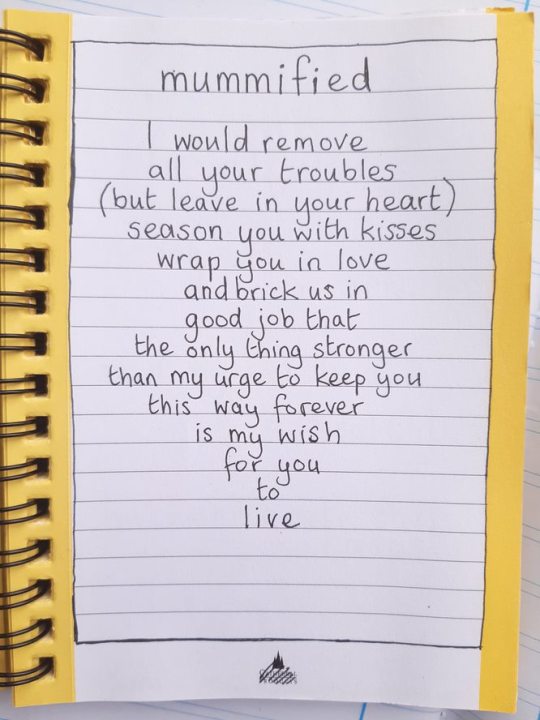
1 note
·
View note
Text
sasuke uchiha’s trajectory / a pro-sasuke meta.
Sasuke was more than just a rebel, spoiled and “whining emo kid” that wanted revenge, I can prove it.
Contains anti Konoha, shinobi system, Kakashi, Naruto, Sakura, Danzou, Hiruzen, Tobirama, SS/SNS arguments, so if you're not ready to handle criticism against your favourite character or ship, don't even read it.
This is for people to think more deeply about Sasuke and his actions, so you don't have to fully agree. But I'm not open for critics or similar. I'm exposing what I think, what I saw and how I interpreted Sasuke's trajectory. If you strongly do not agree with or get offended by anything under the cut, that's not my problem so you can complain over there, don't @ me.
However, if you have any real doubts, other valid arguments to add, or you just want to talk about what you just read / discuss about anything you politely disagree with, you can contact me here or here, or chat me on tumblr itself. I'm not changing my mind though.
Also, a big thank you to my friend who translated from pt-br for me because I’m too lazy. Love you, Konan. ♡
1. WHEN SASUKE LEFT KONOHA:
Here's where Sasuke starts being hated by the Naruto fanbase because it's when he stops acting according to what Konoha believes he's supposed to. But, before hating him, there's a lot of things to acknowledge about.
Sasuke always believed to be an avenger ever since the Uchiha massacre. Even when he began to blend in well on Team 7's dynamic, as soon as Itachi landed feet in Konoha again and he failed to defeat him, he came back to believe in such fact. Thus, he wanted to grow stronger.
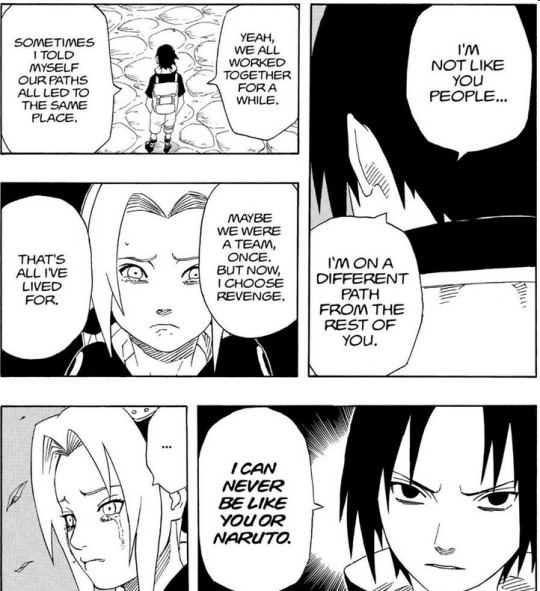
Not just for seeking to be stronger, Sasuke also feels like he doesn't belong to Konoha anymore. Sakura never understood the pain of having everything that matters the most taken away, Naruto never really had anything and Kakashi, the only one who could connect to him, only pushes him away.
1.2. KAKASHI:
Although what people think, Kakashi and Sasuke's relationship was deeper than it seemed. Kakashi was someone that made Sasuke feel safe and vehemently trained him for the Chuunin Exam. In a summary, Sasuke trusted Kakashi and had him as a mentor.
Instead of offering Sasuke the emotional support he needed, Kakashi basically fought him for using one of his jutsu against an ally even though Naruto had done it too and could just have killed him as well. Beyond that, he insults him multiple times and doesn't take his only goal seriously. He tied up the boy to a tree like he was some kind of animal, for God’s sake.
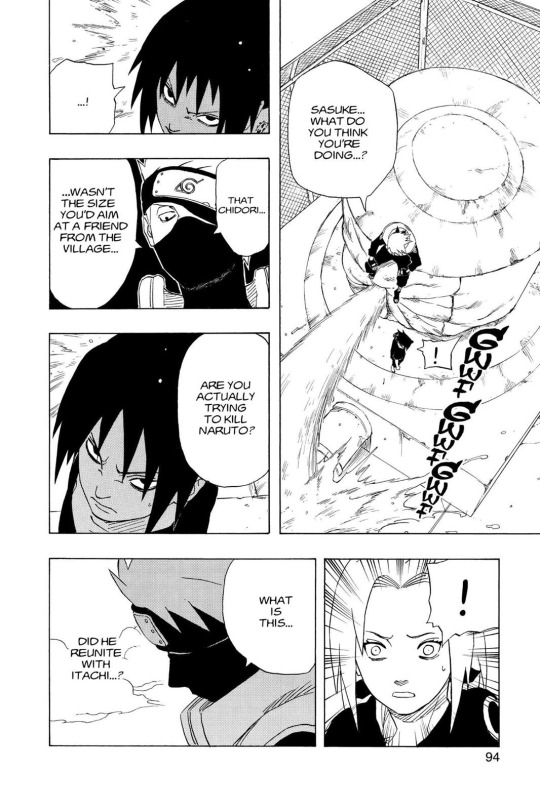
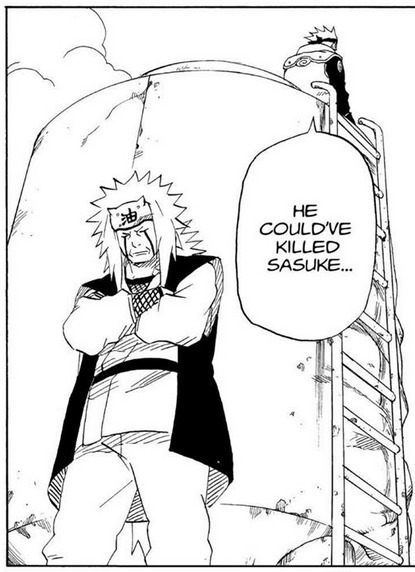
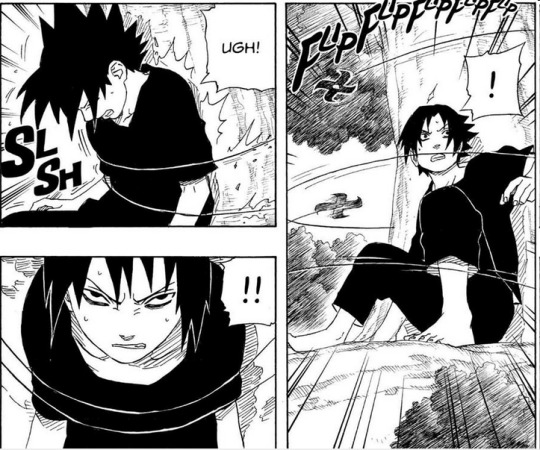
You can read more about Sasuke and Kakashi’s relationship in this awesome analysis.
This is only the beginning of Konoha trying to make Sasuke feel guilty for everything he did and wanted to do, when actually all his hate and thirst for revenge was perfectly comprehensive, since he lost everything to the system he lives in.
1.2. SAKURA:
Besides comparing her pain of losing him with his pain of having his whole family murdered by his own brother, Sakura still blackmails him emotionally because it's all about what SHE wants, about what SHE feels. It only shows she doesn't really understand him.
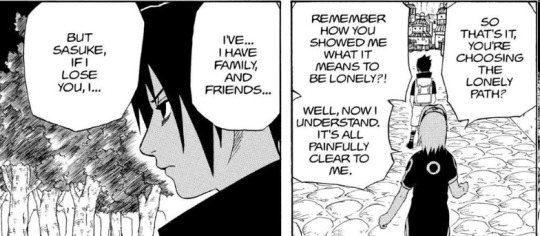
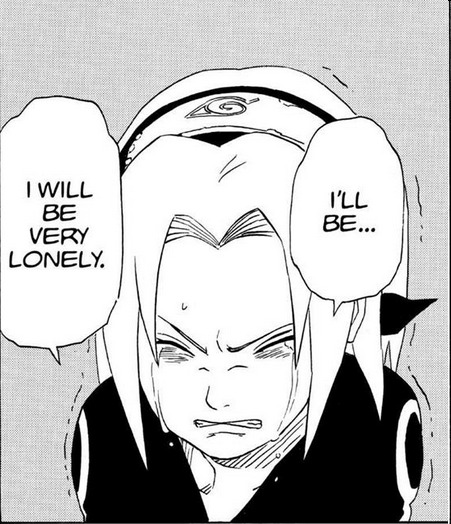
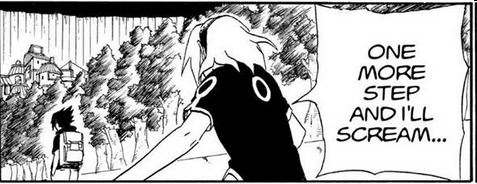
1.3. NARUTO:
Naruto, just like the rest, also doesn't get Sasuke's goals and motivations and tries to stop him from seeking power with Orochimaru, even if he has to "break his arms and legs".
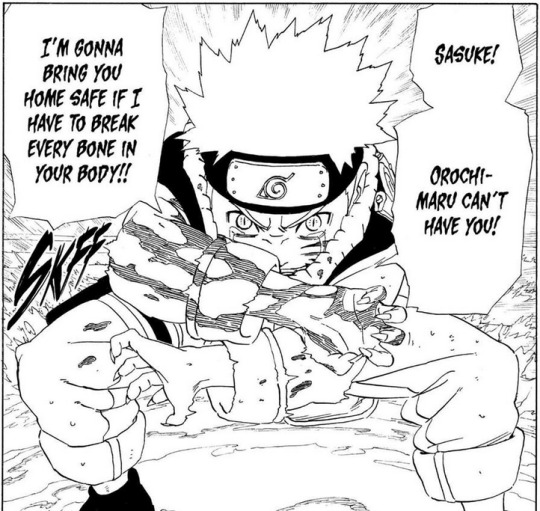
In a summary, the approach of these three didn’t work. Naruto thought he could handle everything with his fists, Sakura thought making it about her own feelings was a good idea, but their lack of maturity is understadable. However, Kakashi understating Sasuke’s pain, like he wasn’t allowed to feel that way because Kakashi himself didn’t (it’s not even the same situation lmao), only made it all worse and was a decisive reason for him to leave.
2. WHEN SASUKE "ALLIED" HIMSELF TO OROCHIMARU.
Besides what everyone thinks, Sasuke doesn't really allied himself to Orochimaru or condoned with his ideology like Anko or Kabuto. He didn't intend for him to possess his body, not before killing Itachi. He wanted to train and get strong.
To this point, Sasuke literally didn't do anything questionable. During training, he never killed anyone or acted as cold as he wanted people to think he was. That's why he says "I'll be merciless in front of him (Itachi)," because that's something he has to force himself to become, not something he is.
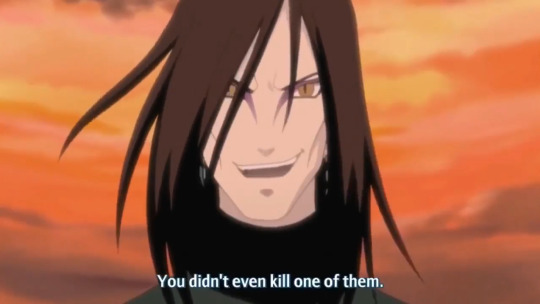
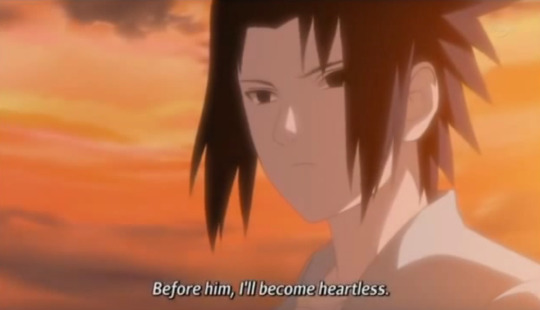
One more proof Sasuke never shared Orochimaru's goals and, instead, used him as a way to obtain more power is his speech before "killing him", where he questions his goals and ways.
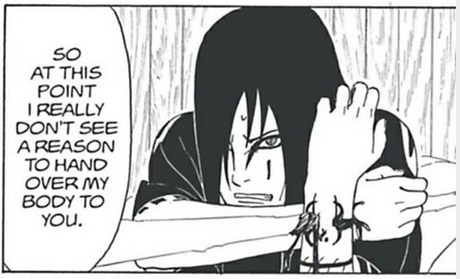
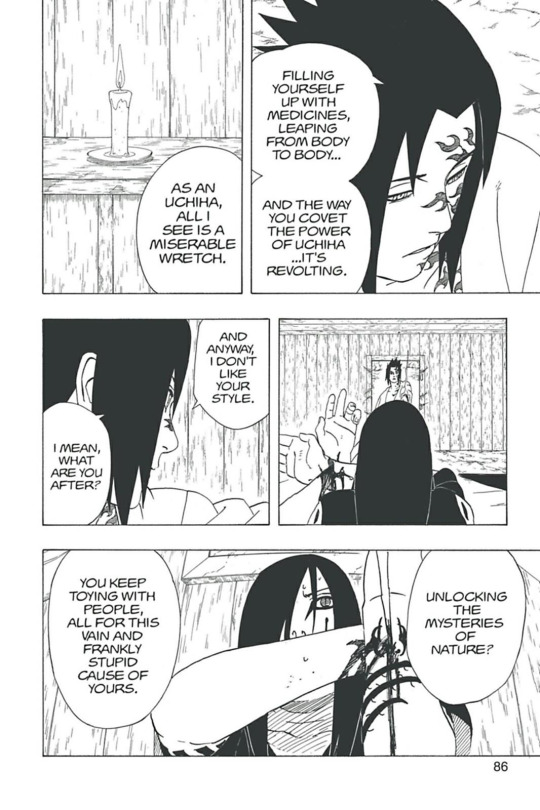
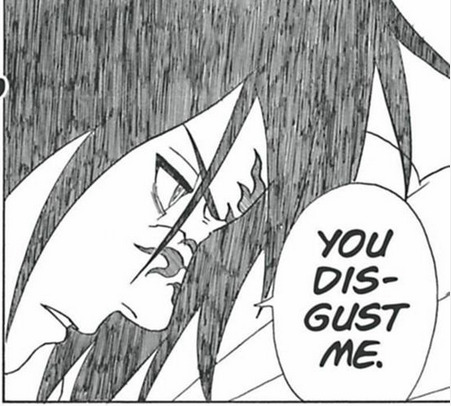
After Orochimaru's "death", Sasuke frees all his prisoners and victims of his experiment, including Suigetsu, Juugo and Karin. In Juugo's case, he offered himself to be his "prison", stopping him from hurting even more people.
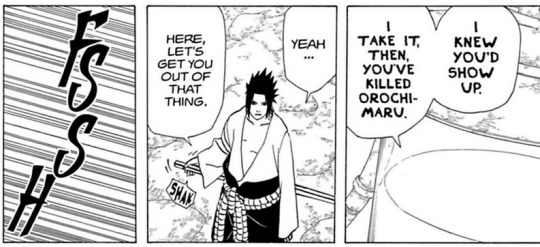
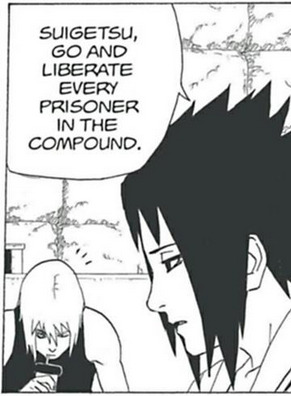
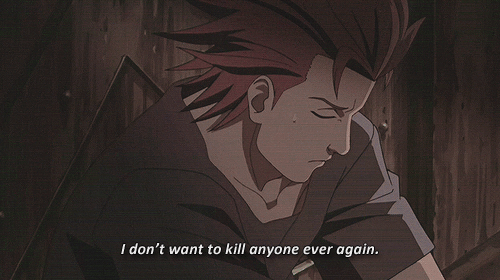
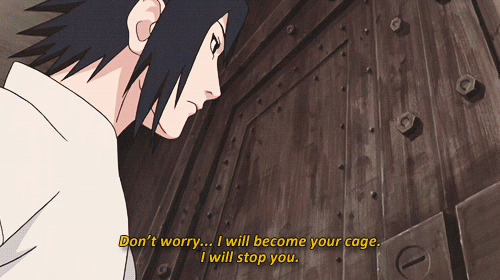
In pursuit of Zabuza's sword, Sasuke prevents Suigetsu from killing just any person.
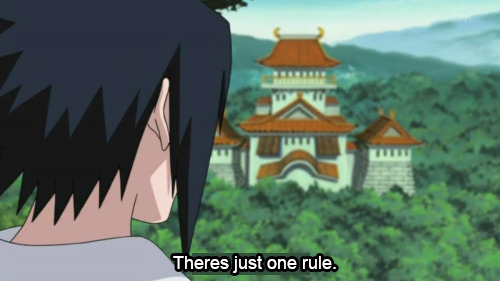
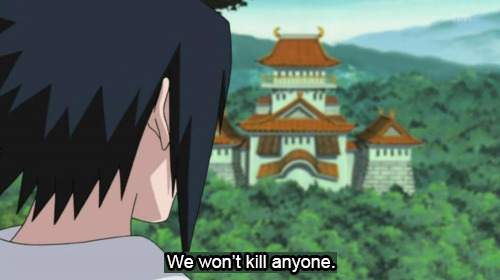
3. WHEN SASUKE LEARNT THE TRUTH ABOUT ITACHI.
This is a crucial point in Sasuke's history because it's where he finds out that the brother whom he always had the goal to kill in revenge actually did everything in order for him to stay alive and become a hero.
At this point, it's important to keep in mind that Sasuke accomplished his lifetime goal, the only thing he believed he was alive for. Many times he said he didn't care as to what happened with his life after that moment, so it is unimaginable the misery and emptiness that he felt. Pay close attention to the expression of his eyes.
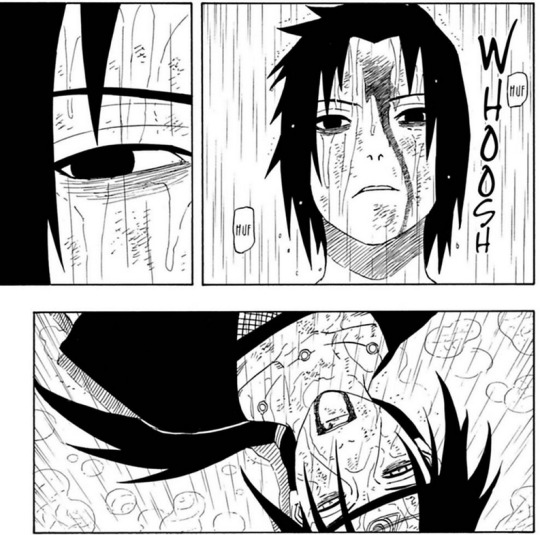
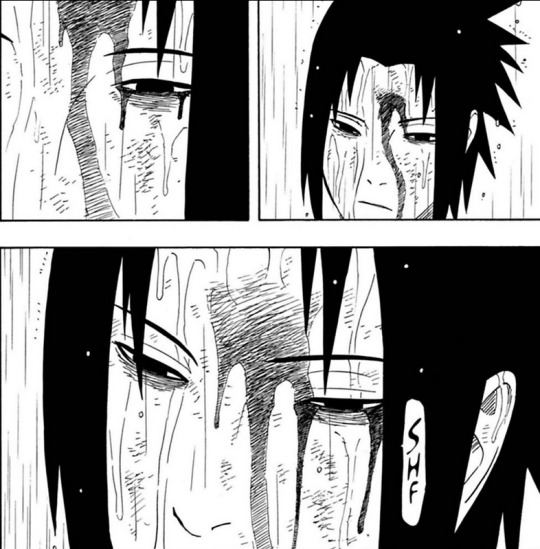
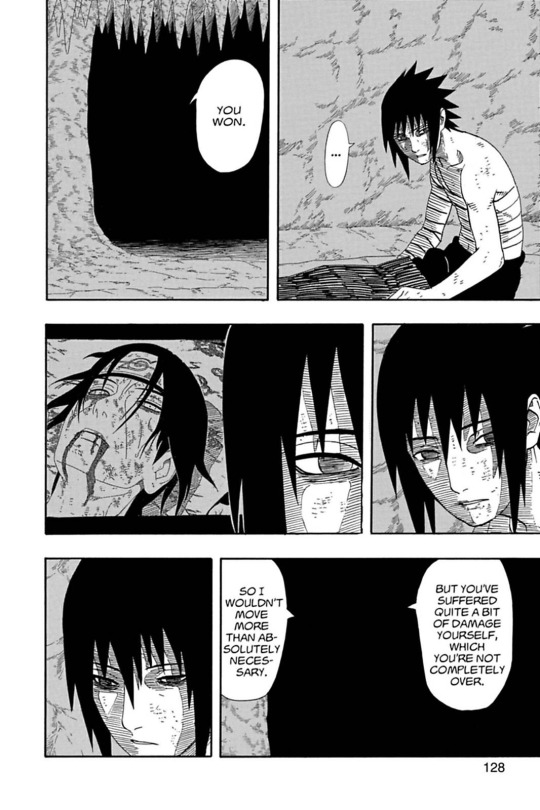
Not even the sight of another Uchiha alive took this expression of pure misery from his eyes. That’s how broken he was at this point.
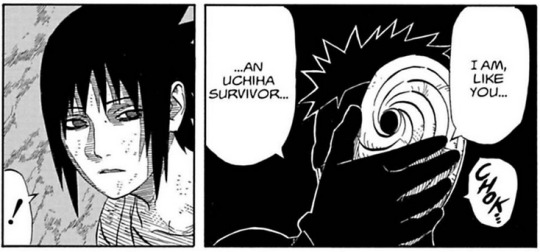
Obito took advantage of Sasuke's mental instability to pour over him all the truth about Itachi. At the minimal possibility of all the acknowledge about his brother and his entire life being a lie, he breaks down, literally blacks out.
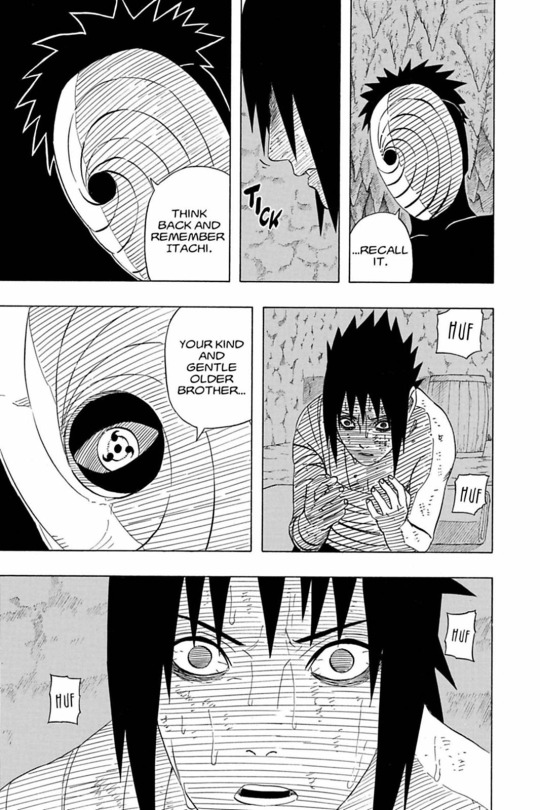
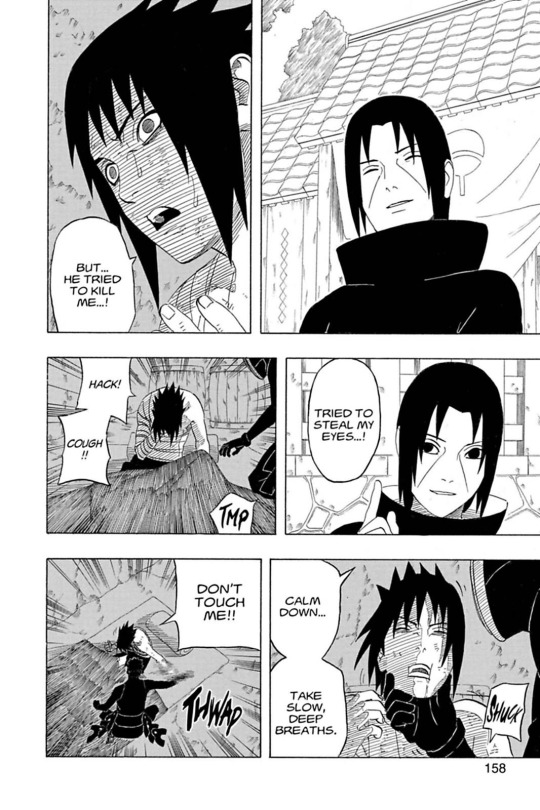
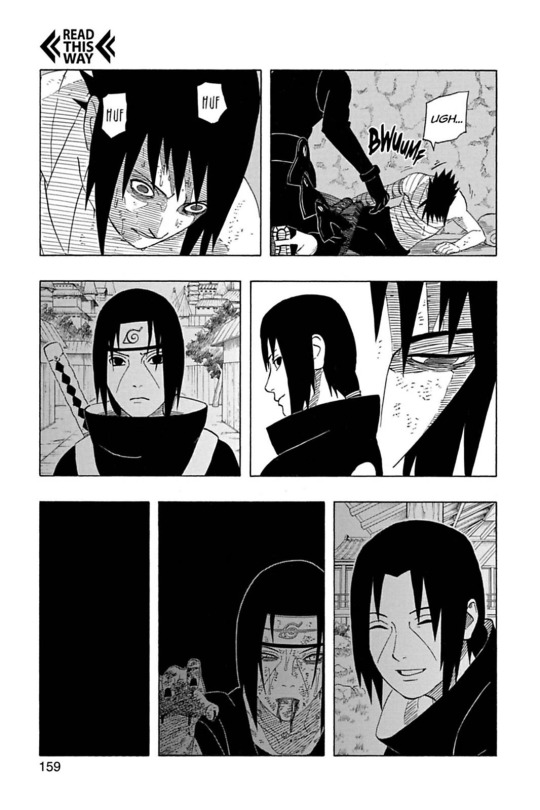
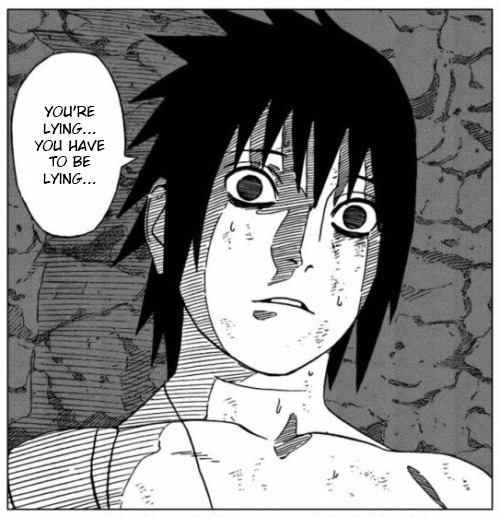
At this moment, there is a giant lack of critical sense from the fandom. Sasuke finds out that Itachi was coerced to do a mission to save his life at the behest of the Konoha leaders. So it's OBVIOUS that he couldn't return to Konoha after knowing the truth.
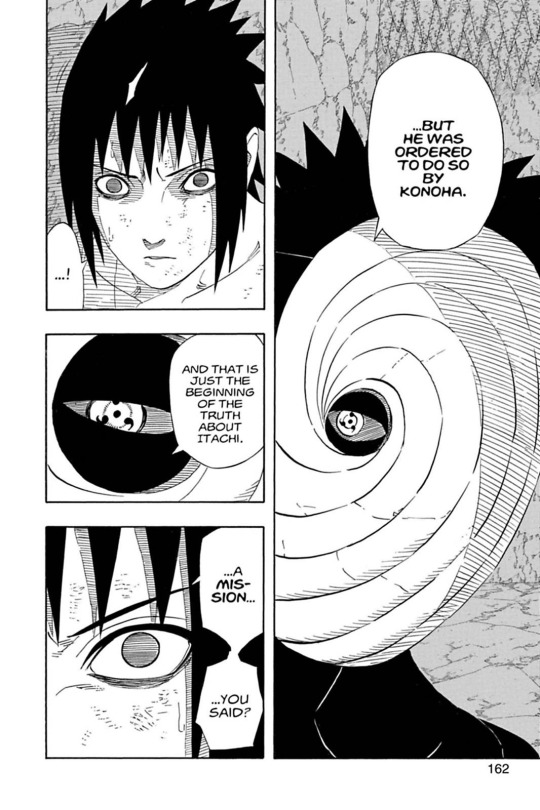
Many think that, since he knew Itachi did everything for the Village (which wasn't exactly the truth because he'd feel doubtful before, but made his decision once Sasuke's life was threatened), Sasuke should, too. But instead, he hates who made Itachi suffer.
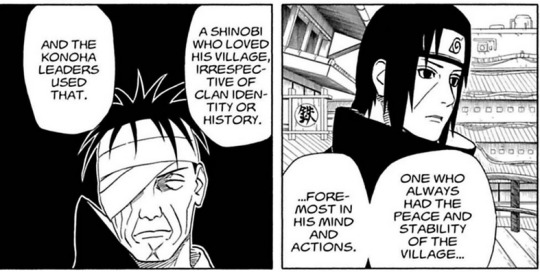
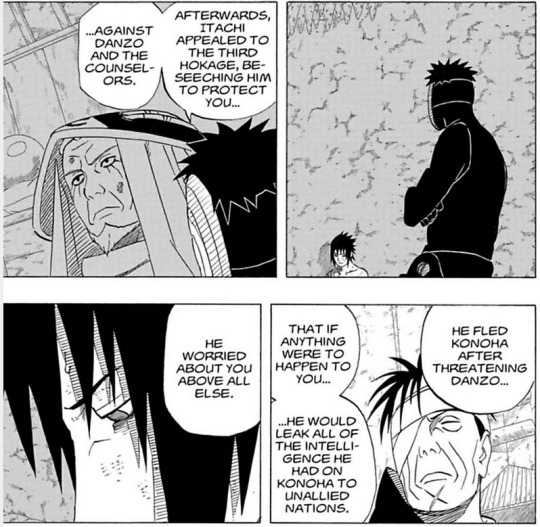
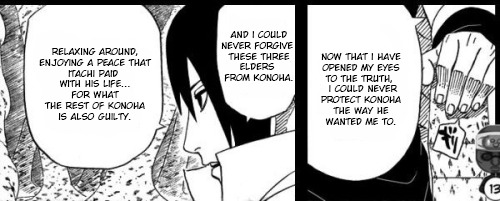
Not only because of his brother, Sasuke hates Konoha for the way it treated his clan, with mistrustfulness and discrimination over one of the families that helped founding the Village.
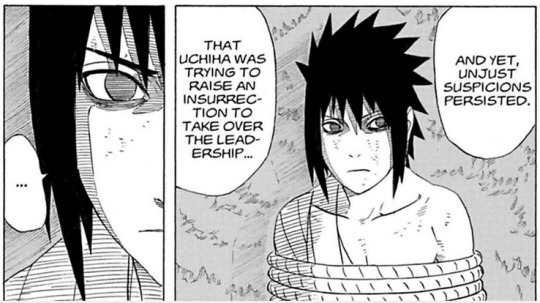
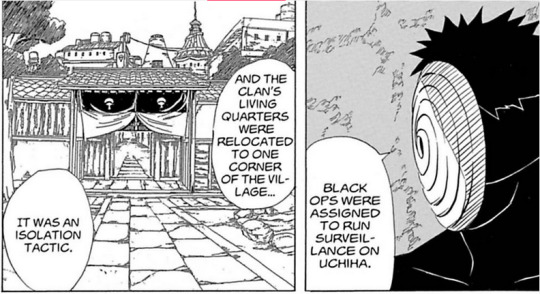
"Even in the middle of the most profound despair, his eyes reflect a single ray of hope"*. That summarises well how Sasuke felt without any perspective of life, but grabbed onto the first shadow of objective that was offered. Obito knew how to take advantage of Sasuke's misery.
*This is a sentence that is written on chapter’s 400 art cover but I couldn’t find it in English.
4. WHEN SASUKE INVADED THE KAGES' REUNION.
Recruited to Akatsuki and manipulated by Tobi, Sasuke made his first move directly against Konoha when he appeared at the Kages' reunion to face Danzou, one of the responsibles for his clan's genocide and Itachi's sacrifice.
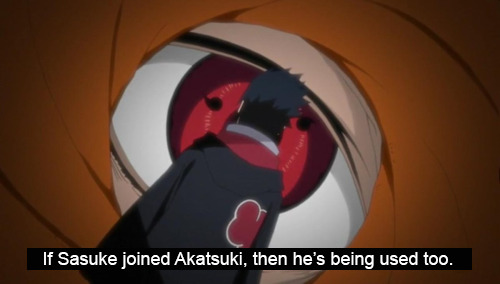
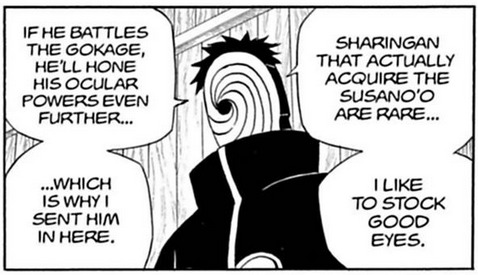
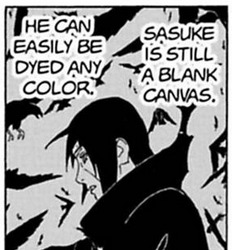
Sasuke's plan was to find Danzou and destroy him like part of revenge against Konoha, but Zetsu alerts the Kages about his presence in the place, which causes everyone to fight against him.
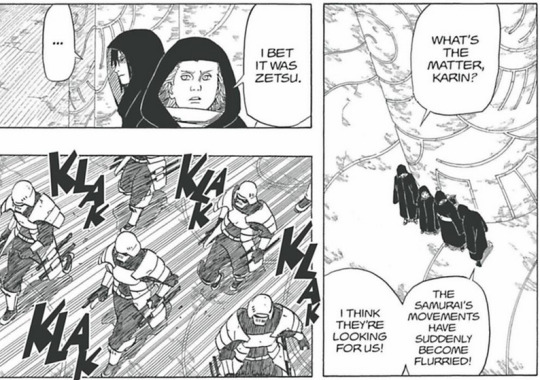
From here on, Taka starts to question Sasuke's sanity multiple times because of the sudden change in his chakra. Gathering all the precious traumas, the guilt for Itachi's death and sacrifice and the hate over who made him go through it, he was on the edge of going mad.
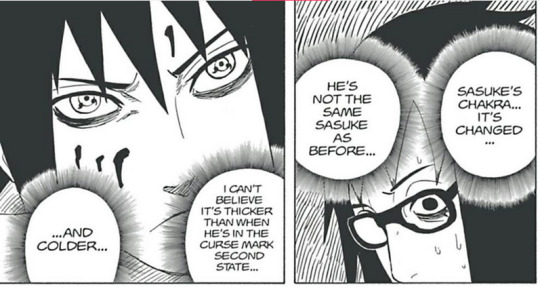
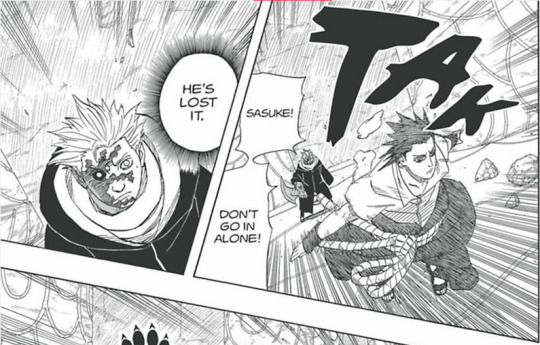
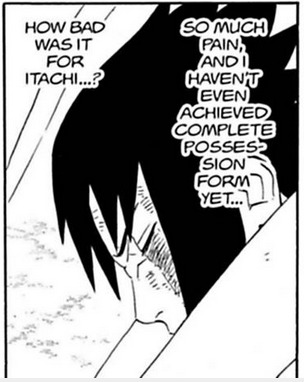
At this point, Sasuke doesn't put anything above his goals. Danzou confirms that Itachi's sacrifice was true and nothing else matters to him, so he kills Danzou and sacrifices Taka. After that, he realises Sakura's intention to kill him and strikes back, trying to kill her as well.
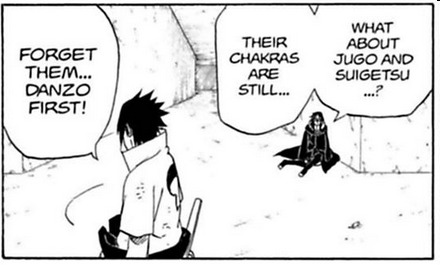
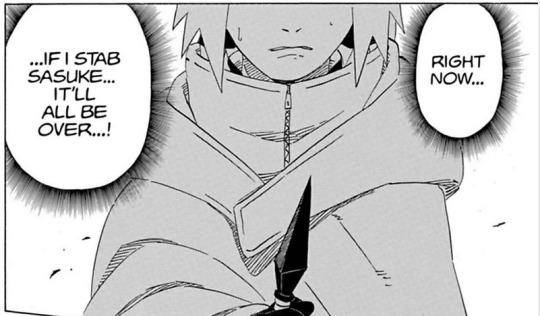
Then Sakura tries to kill him once again, and once again he defends himself trying to kill her back. The same happens with Naruto and Kakashi. So psychologically unstable, he doesn't even care about his physical limitations and insists on keep on fighting blindly.
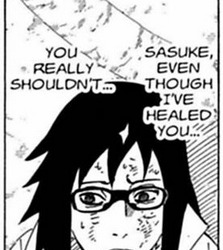
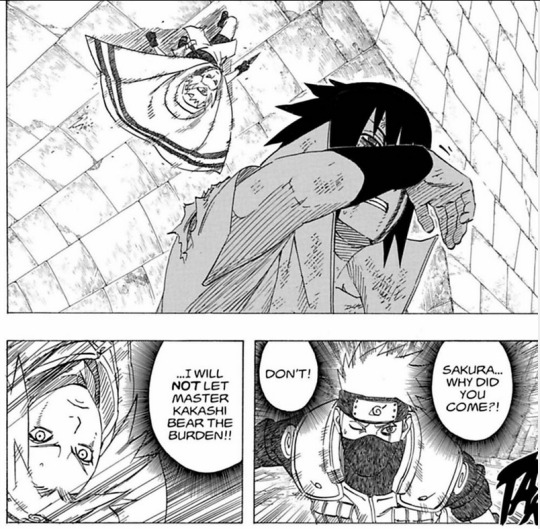
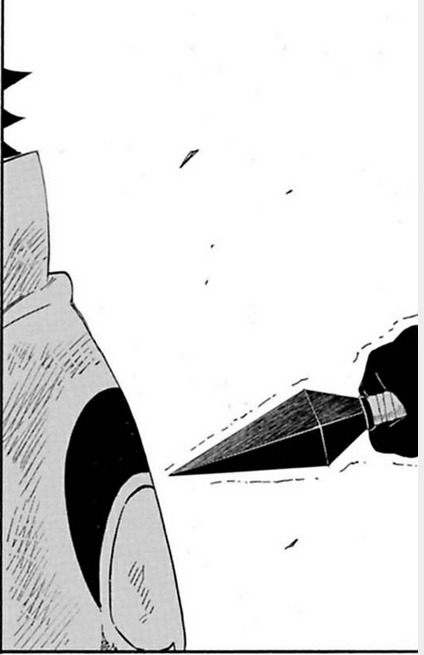
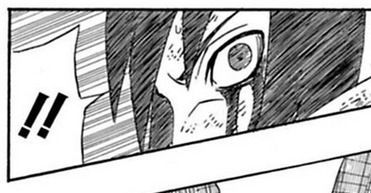
We all know Sakura hesitated but Sasuke didn’t. His sight was troubled and she came from behind. He was defending himself.
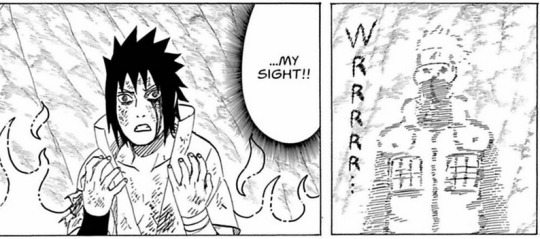
Tobi advising him to kill Karin:
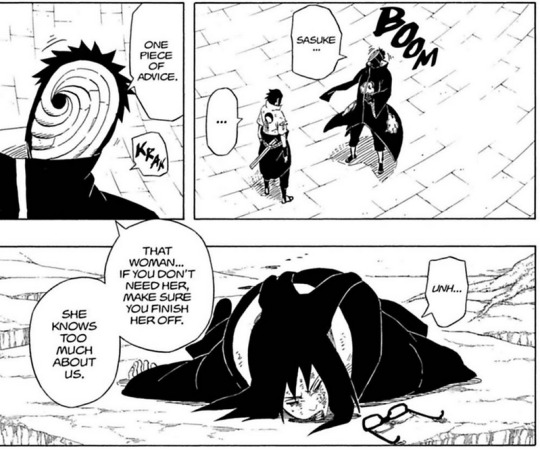
As much as Sasuke was reluctant because he wanted to be definitely full hatred, vulnerable regarding physical strength, he voluntarily decides to hear what Naruto has to say.
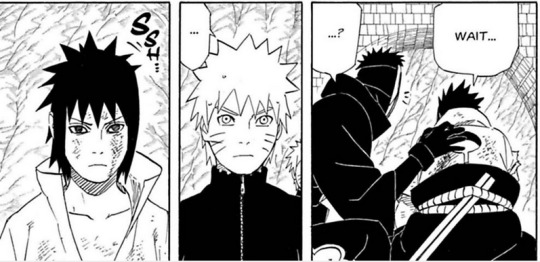
Then Naruto starts the “because we’re friends” talk and Sasuke clearly feels kind of affected because he actually wants that bond so badly but he also wants justice for his brother and clan, about what he’s totally right.
In a summary, besides the declared intention to kill Karin after she was hit because of his shaken up sanity, Sasuke acted in self defense and in defense of his goals, what ended up not killing anyone.
5. WHEN SASUKE JOINED THE WAR.
Sasuke meets Itachi's edo tensei with still profound grudge over Konoha for what it did to his brother. He wanted answers from Itachi in order to confirm everything that was told by Tobi and Danzou.
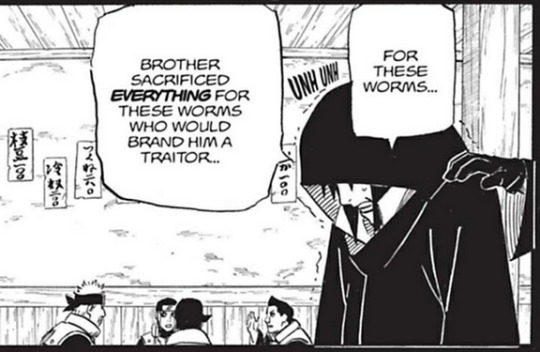
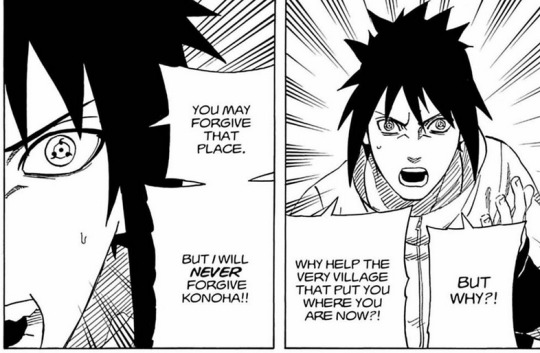
The closer to Itachi he feels, the more Sasuke hates Konoha and wants to revenge his brother for being forced to sacrifice himself.
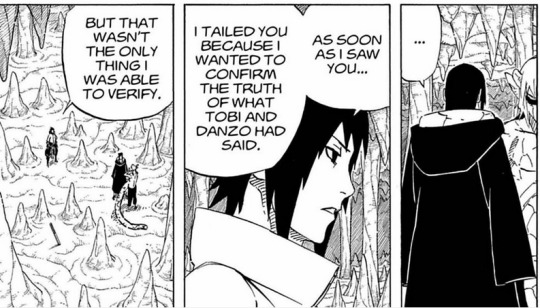
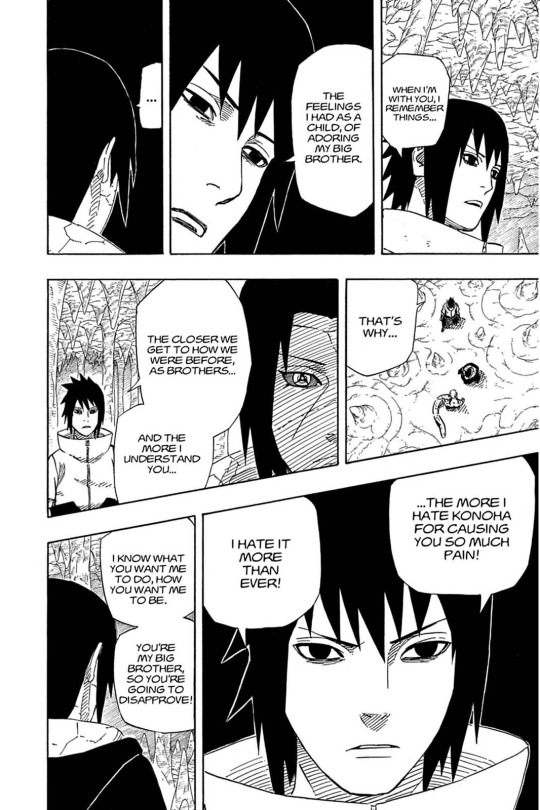
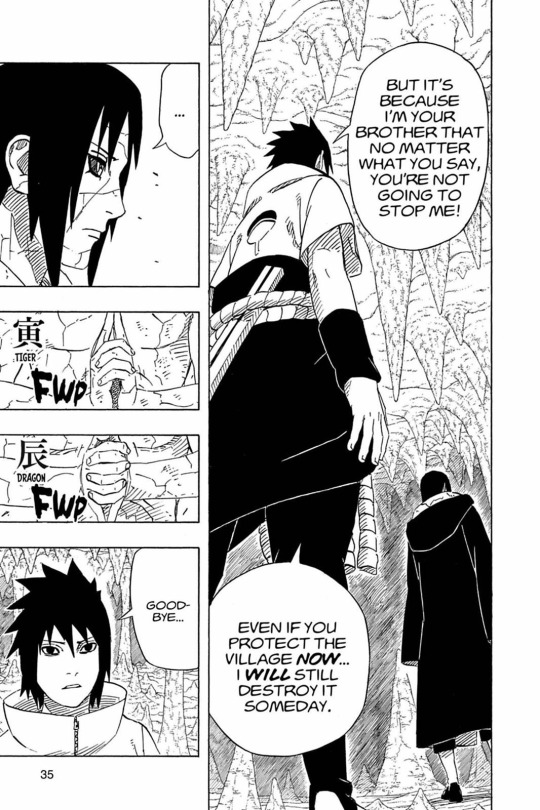
After confirming that Itachi's sacrifice for the village and himself was true, Sasuke falls into an internal conflict for not being certain of any concepts anymore; of a clan, a village, a shinobi, and even himself. To obtain answers, he resurrects Orochimaru to bring the Hokages back to life.
There is a lot of virtue and maturity in Sasuke's decision of understanding all the concepts through their stories. Patiently, he listens to Hashirama's version about everything to then come to a conclusion on what to do about his revenge and himself.
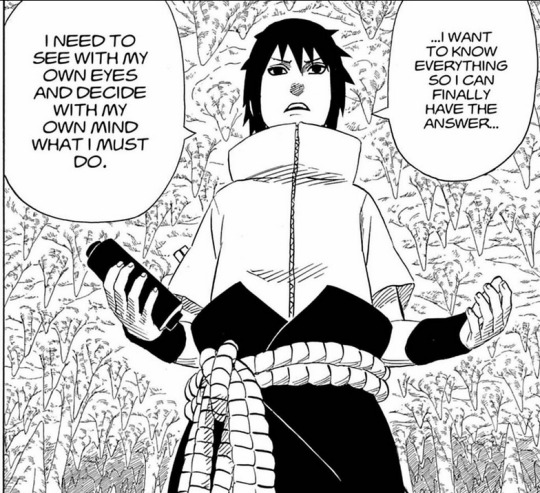
Hashirama talks about his and Madara's trajectory, inwardly connected to the Village's concept, which he had helped found. And allied to the concept of a ninja village, he defined sacrifice as one of the methods to protect it, which Madara stated would drag the Village into darkness, what was clearly a reference to Itachi and the Uchiha's sacrifice, culminating into Sasuke's personal hell. In the end, Hashirama ends up taking the responsibility for this method being considerated valid to protect the Village.
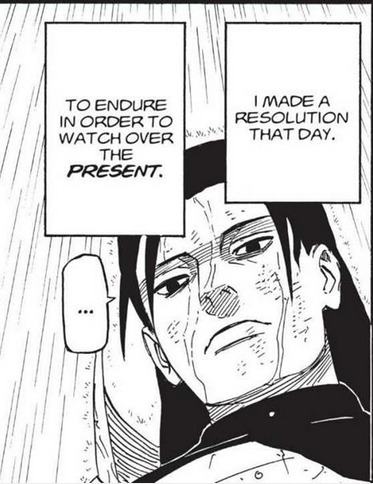
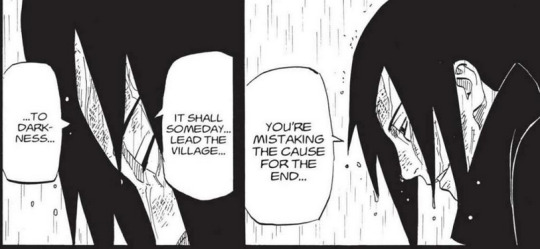
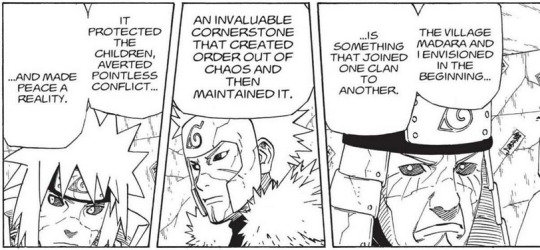
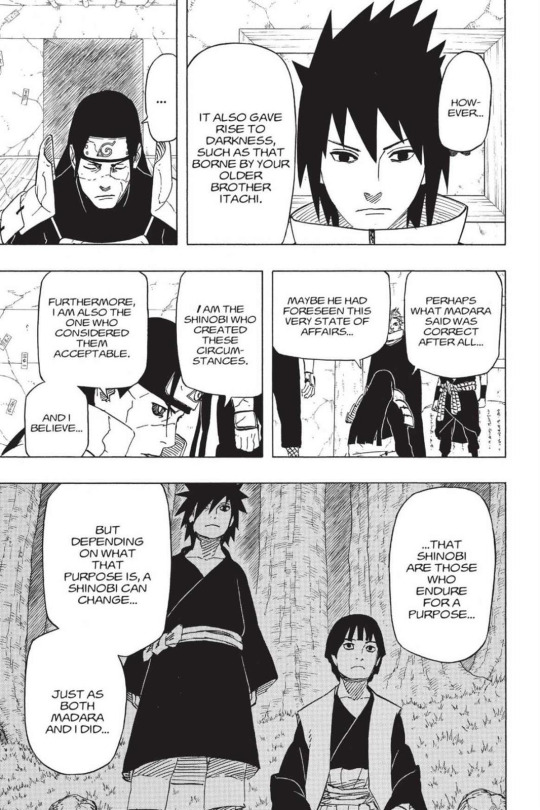
In front of all that, Sasuke, for now, decides to battle next to the Shinobi Alliance so that his brother's sacrifice wouldn't have been in vain. Next to Naruto and Sakura, he seals Kaguya and has an important part in the world's salvage. Without him, there would literally be no way to save it.
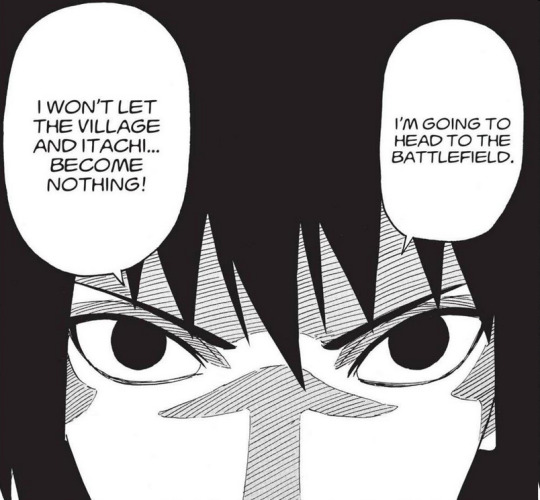
Besides all of that, he still recognised the mistake he made on Karin and asked for her forgiveness.
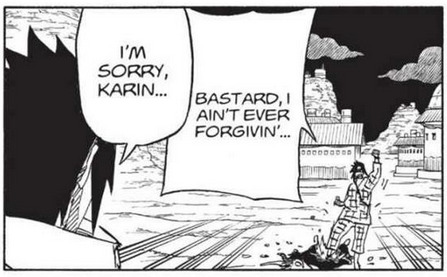
An addendum: SASUKE DID NOT TRY TO KILL SAKURA IN THIS MOMENT like a lot of people try to decontextualise. He put her in a GENJUTSU, the same way Itachi did to himself after the Uchiha's massacre. One more reenforcement to his attempt of cutting his ties with the previous Team 7.
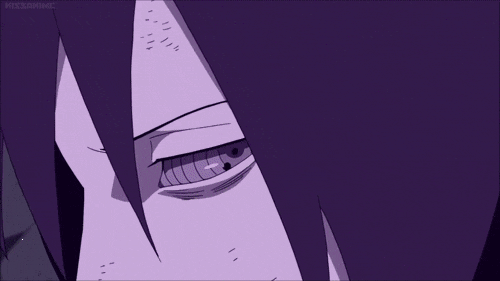
6. WHEN SASUKE BATTLED NARUTO.
To this point, Sasuke comes to an obvious conclusion, but that requires extreme perspicacity from a 17 year old kid: Konoha's problem was its system. The failure that would allow sacrifices like Itachi's to happen was structural.
Even Orochimaru, when resurrected, acknowledges Sasuke's maturing.
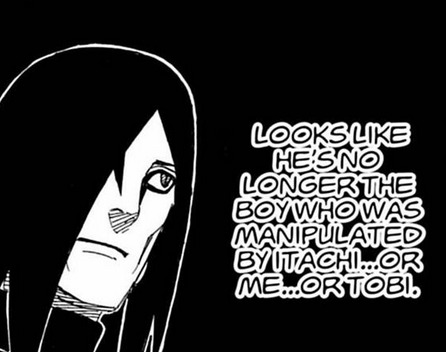
With that in mind, Sasuke decides to become a Hokage and lead a revolution that would change the shinobi system and would nip the world's evil in the bud.
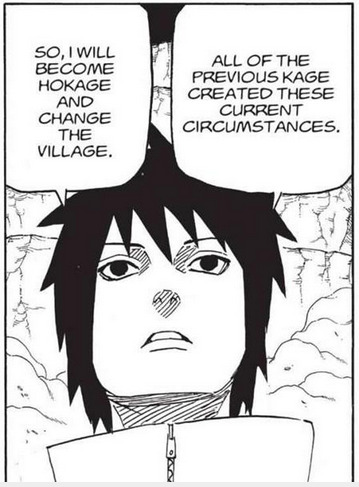
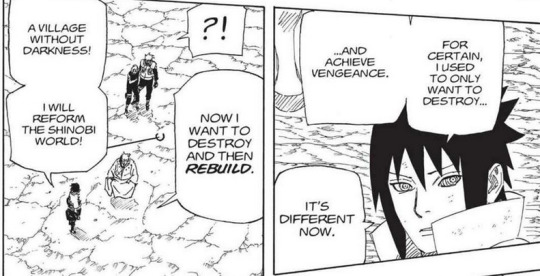
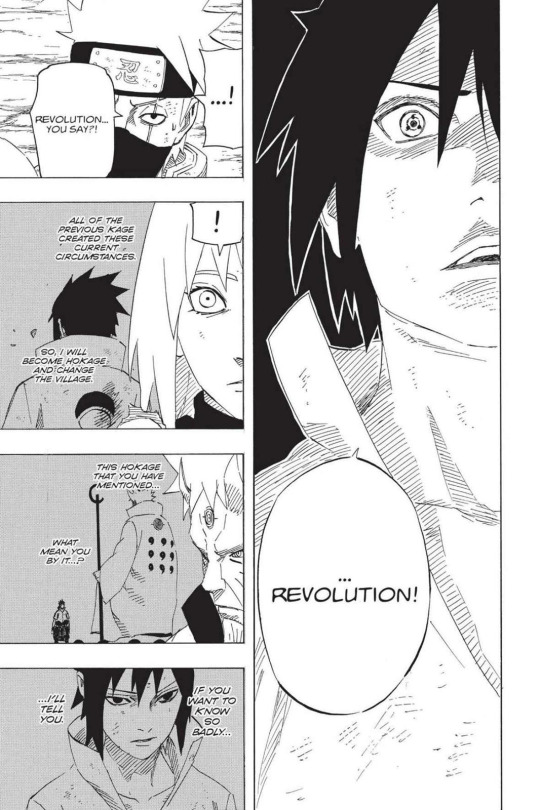
Sasuke's revolution consisted in following Itachi's steps, his great inspiration and influence, sacrificing himself to carry alone all the hate in the world. The intention of it was to unify the whole world and that only he would have to deal with the Villages' darkness.
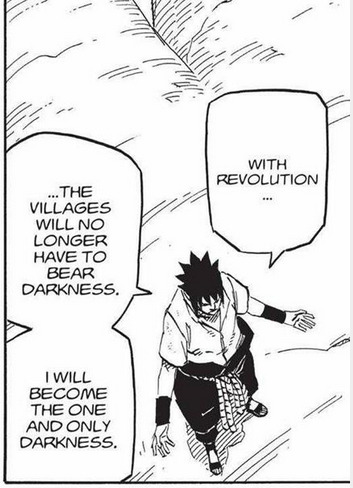
This new goal of him destroys every argument against him that paints him as someone egocentric and selfish. Everything Sasuke wished for was to deal with the darkness by himself in a way that there wouldn't be any more sacrifices like Itachi's or of children like himself and Naruto.
Therefore, as noble as his objectives were and as mature as they sounded for his age, Sasuke sins on the chosen ways to start his revolution (even though I wouldn’t mind if he killed the kages whereas all their war crimes). Still, it's comprehensive since he started using Itachi's example as a guide of his actions.
Sasuke then apologised for all the suffering he caused his friends, even though it wasn't really his fault. He felt so responsible for the bad events that he left on a redemption trip to see the world with his own eyes, proving his maturity once again.
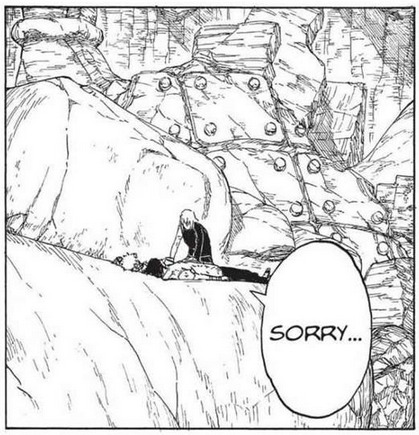
7. WHEN SASUKE LEFT ON A MISSION.
I want to start this section saying how much I despise for personal reasons (it’s explained at the end of this meta) canon adult Sasuke for what Kishimoto did to his character but I defend him anyway because he’s still hated for absolutely wrong reasons.
Apart from everything he went through previously, Sasuke was brainwashed accepted the position of shadow Hokage and started to protect Konoha even if the village never had redeemed itself for its crimes against his brother and clan.
He sacrificed almost an entire life next to his wife and daughter in favour of not only Konoha, but the world, since he was the only one who could track traces of Kaguya thanks to his Rinnegan. In the meantime, he saved the village again and again.
Sasuke is constantly judged for pointing out a sword in Sarada's direction on their first meeting, although there wasn't how he'd know that, out of all people, she would be there (thank you Naruto you’re so responsible, no wonder you’re such a good parent lmao) considering there were sharingan user clones walking around.
Anyhow, he saved his daughter when it was needed and searched for Sakura to guarantee her safety, even though he had defended that she would be fine since she was as strong as him and Naruto. Besides, he AGAIN helped saving everyone.
FINAL CONSIDERATIONS & PERSONAL ANALYSIS.
Sasuke was a child that had everything and lost it all in the most traumatising way possible to the person he loved the most, ordered by the Village he grew in. He saw his family BEING SLAUGHTERED thousands of times in Itachi's genjustu when he was just a kid.
He had his only goal ripped from him on his teen years when getting rid of the target of his revenge only to learn that he actually had sacrificed himself on HIS BEHALF, since his LIFE WAS THREATENED by the superiors responsible for Konoha.
Although being a completely traumatised child and psychologically shaken up, being manipulated by his brother first, then by many others who only wanted to take advantage of his abilities, Sasuke still became aware of the world enough to want to change it for the better.
The revolutionary ideals that conferred depth to the character and made him promising were devastated because antagonists are portrayed as "insane", "out of their minds", "dominated by hatred" so we'll think the revolution of systems is a crazy people thing.
Sasuke was a victim of the system that allows 13 year old children to kill their families in sacrifice of a "greater cause", like this kid and theret family weren't part of who deserved protection. If he had controversial actions, Konoha and its system are the ones to blame.
The real guilty ones are Tobirama, who SEGREGATED the Uchiha without a reason; Hiruzen, that didn't have any tact or pulse to deal with Danzou and the Uchiha; and Danzou, whose crimes I don't even have to mention because they're common sense. If you want to blame someone, these are the ones.
Even though the real guilty ones were previously mentioned, Sasuke was thrown in jail and still got scolded by the greatest Sixth Hokage, his said mentor, who told him to "try not to go mad again", like it was his fault for being traumatised thanks to the Village.
And that's why I hate the ending of my favourite character. It has nothing to do with some kind of ship like many may think (even though I’d much prefer him to end with someone who could really understand him), but because he was distorted to fit in a stupid and conformist narrative, when he had a marvellous potential as a character.
And as if it's not enough, he's hated and made fun of in the fanbase, even though he's the only one, among the kids, to really make sense, even with all the traumas he suffered. Even when he had proved not to be selfish, or dumb, nor egocentric or a terrible father or an abusive husband and etc.
Sasuke Uchiha did nothing wrong and I just proved it. If you, a possible anti who read it all the way here, still want to keep in the ignorance of hating the character based on his actions then that's on you. I've done my part. That's it. Now go love my baby cause he deserves it. ♡
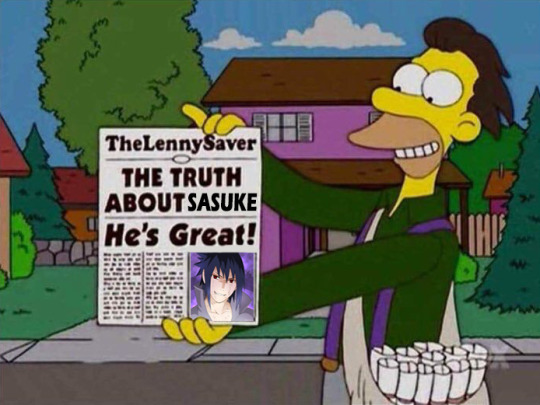
I couldn’t get to all of these opinions without help, so I’m recommending some important pro-Sasuke posts (besides the ones I already did during the post).
Sasuke changing the shinobi system thread. About adult Sasuke. Sasuke’s “crimes”. Sasuke’s protectiveness 1 and 2. Anti SasuSaku fandom. Naruto’s feelings for Sasuke. The Fucking Will Of Fire™. Why pro-Sasuke people are pro-Sasuke anyway? Anti-SNS. Sasuke’s guilt trip.
pt-br twitter thread / pt-br tumblr trans
#sasuke uchiha#pro sasuke#meta post about sasuke#pro uchiha#pro itachi#anti ss#anti sns#anti naruto#anti hiruzen#anti danzou#anti tobirama#anti kakashi#anti konoha#anti shinobi system#anti naruto ending#i spent hours and days preparing it#i hope it helps to save some antis' souls#mine
192 notes
·
View notes
Text

here we go !!!
first of all, i’m all for the idea of kuwabara being intimidated by his father.

now, since not much is really known about him, it goes without saying that he’s a very casual guy, who’s to say that his casual demeanor wasn’t there when both kuwabara children were young ? seeing as kuwabara spends a lot of time with shizuru and not his father, i’d like to believe that they live on their own.
maybe it’s a situation where shizuru moved out and kazuma went with her ? shizuru mentions their mother in the anime briefly when threatening kazuma so i guess she’s still alive ? it’s in passing and it’s really quick, but then again, it doesn’t feel like she’s all that present in their lives.
another idea that comes to mind is that their father and their mother have split. kazuma’s very harsh to his father, at least from what i’ve seen, but he has a general animosity towards adults. he doesn’t do well with authority and being told what to do. that’s maybe why he went off with shizuru, even though she still tells him what to do.
that leads me into his relationship with his sister. hold off on his father for a bit.
i love kazuma being close to his sister but not saying anything about it. he’s definitely someone who has a difficult time being straightforward about how he feels, or even sharing his emotions. it’s that steeled facade he tries to pull, maybe in order to combat the fact that his father might’ve deemed him soft, or weak, or too expressive as a child. it would make sense that shizuru worries about him so much, because he’s going to hard with the fact that he has to be indestructible when she knows very well he can be broken.
as children, kazuma probably would’ve been very attached to his sister. she’s a strong and independent woman, and probably has been her entire life. he was probably compared to her a lot by his father. she was the oldest sibling and more likely than not picked up a lot of their father’s habits, like smoking.
anywho, as time went on, chances were, his father’s desire to have a son who had a stronger will and could hold himself physically as well as emotionally and mentally was what drove him to try and prove not only his father wrong, but also everyone and anyone he came across. that drove the stake between him and his father, without his father really knowing this is why kazuma grew to be as troubled as he did. it’s probably funny to him if anything because his son’s just a reckless mess that he doesn’t have to deal with since he moved out with shizuru.
but back to shizuru. we all know she cares about her brother, a hell of a lot. i think she realizes and understands the kind of person he is or that he wants to try to be and does her best to express her distaste for his behavior, without really forcing him or trying to ‘parent’ him too hard. it just wouldn’t work. that’s why, when he finds things he can do and succeed in or things he can do and be proud of, that’s when she praises him, at least, with a bit of playful banter attached.
now, he cares about his sister. he would die for his sister. the one thing he won’t do is tell her that. the worst thing that can happen is that she make fun of him for him. emotions are weakness in his eyes, especially ones that might make him appear vulnerable. the worst thing that could happen to him is that he’s vulnerable and unable to stand up for himself. emotionally, he’s unable to do that. he’s unable to defend his emotions in a way that will make him feel safe. when he’s afraid, he gets angry. when he’s sad, he gets angry. when he’s happy, that’s fine. when he’s in love, that’s also fine because it gives him the drive to fight harder. when he’s upset, he’s angry. anger is the default to cover everything up, and it’s what gets him into the most trouble.
he’s just scared of having someone call him out on the fact that he feels emotions that aren’t always positive.
so what happens when he’s open with shizuru ? believe me, it’s probably happened a few times. it’s probably just the two of them, sitting outside, passing a cigarette back and forth, shooting the breeze. it’s not a therapy session or shizuru trying to pick her brother’s mind. if there’s something he wants to share, he’ll do it on his own. that’s the best way to get him to open up about whatever’s on his mind.
there have been a few times that shizuru probably demanded that he sit down and talk, maybe if kazuma were in a destructive rage or screaming without any real substance to what he was screaming about. a good smack across the face would knock him out of his fit. in fact, he wouldn’t dare lie a hand on his sister so one good smack is all it takes for him to quiet down.
it’s a really-- depressive family dynamic. the two of them aren’t very open people, yet they both struggle together to understand each other and fix what needs to be fixed and talk about the things that need to be talked about. they’re both hurting in some way or another and don’t know how to help each other apart from simply existing with each other.
and to loop it all around: the high expectations their father held on both of them is probably what made these two the way they are. shizuru had to be the older sibling, the example, and the stronger of the two, leaving kazuma to try too hard to get attention that it took a nosedive into him losing his ability to connect with himself and his emotions. shizuru, not really being able to do that from the start, now has the responsibility of being the parent that theirs never really were to either of them.
it’s bittersweet.
#↪ ᶤᵗ'ˢ ᵃ ᵍᵉᶰᵘᶤᶰᵉ ʰᵉʳᵒ'ˢ ᵗᵃˡᵉ : headcanon#this was supposed to be about insecurities#and it kind of is#but it's mostly about the kuwabara family
6 notes
·
View notes
Text
Cards on the table: I love Oswald most of all. I am #TeamOswald to a probably irritating extent. I also hate all the ways he’s (both knowingly and unknowingly) taken advantage of Ed.
I think he hates it too, honestly?? I think regret is part of the love-based weakness he’s vowed to do without; to even attempt to make things right with Ed would require him unraveling the way he sees the world like he did after his mother died. Self-preservation is one reason he won’t do that, yes, but I think it’s more complicated than that.
Oswald has never argued that Ed didn’t deserve revenge for Isabella. That wasn’t just killing someone Ed cared about, it was using the fact that Ed trusted him against him. It was reveling in the knowledge that Ed would never suspect anything was wrong, no matter how irritatingly obvious Oswald was about hating Isabella or how obnoxiously he reassured Ed that nothing had happened to her. Oswald is a good liar. He enjoyed not having to be. He enjoyed conflating the fact that Ed wouldn’t pick up on the warning signs with the idea that Ed loved him. (Hi, Ed is autistic, thanks for your time.)
He fucking knew this was wrong, he flat-out admits it when Barbara threatens him: he should have been thinking about Ed, not himself. He forgives Ed everything Ed has done to him in 3x14, forgives the destruction of the things he cared about and the fact that Ed took advantage of intimate secrets, because he did the same to Ed and he knows it. He’s forced to confront the fact that he hurt Ed, and he’s willing to die to prevent Ed from getting hurt again.
That first warning not to shoot him is so good: it’s so sincere, framed simply and clearly in a way that’s focused on Ed. (“I love you. I’ve proven that today, you were there, you can trust it. Listen to me when I say you’re about to hurt yourself.”) It’s so so far from the frenzied way he warns Fish against Maroni in Season One, deliberately inflammatory, trying to incite intrigue and argument and give himself a chance to escape. He has to know that sincerity isn’t going to work, that he’s ruined any chance of Ed actually listening to him now that he’s taken advantage, but he still tries. He physically reaches out even though he has to know it’s only going to make things worse. None of that is manipulative. That’s all completely honest, that’s him totally focused on Ed and how much he loves him and how well he knows him and how desperately he doesn’t want things to end this way.
Then Ed makes him mad and he goes on the attack, playing off of fear and insecurity because he can, he knows Ed’s weak points, and it’s what he’s always done. If you watch Ed’s face, it works. Oswald’s getting somewhere, he’s shifting the scales, making Ed doubt himself. Despite what Ed says about Oswald not being able to talk his way out, he very nearly does. If he’d pressed his advantage and kept going, or gotten Ed off-guard enough to take him by surprise, he could have walked away.
But, incredibly, he pulls himself back. I’ve always loved the way he begs Ed to “say something,” because it’s such a huge departure from everything we’ve seen of him up to that point. From the way he chatters desperately to Jim in the Pilot to the way he perfects his speeches in Season Three, talking is Oswald’s primary weapon and his only real defense. He gives that up in this scene. He leaves himself utterly vulnerable, maybe more so than in being willing to sacrifice himself earlier in the episode; at least there he had Ed’s safety to win by his death, and it was an active choice. He turns this scene back over to Ed, leaves it all in his hands, just like he does when he forgoes last words the next time around: he doesn’t want to live or win or lash back as much as he just really desperately hopes that Ed doesn’t want him dead. The only way he’ll know is to let Ed make that decision.
He understands why Ed shoots him. That’s what breaks his heart: knowing that he deserved it and that they both knew it. That’s why he comes back ready to fight instead of to apologize or to manipulate things in an attempt to win Ed back and get what he wants: he doesn’t expect Ed to forgive him, and doesn’t want to lie his way out of this. Oddly, you can read it as a sign of respect, that he accepts his culpability and is willing to play on the Riddler’s terms because it’s the game Oswald has resigned them both to, even if it breaks his heart.
He never wanted to fight Ed. I absolutely believe he would have let Ed walk away the second time if he hadn’t pulled the trigger, that he used having the upper hand as a chance to try one last time for something that worked for him, something more nuanced, something salvageable. But it was black and white for Ed, and he accepted that. He tried to make it black and white on his side too, tried to use Ed’s logic, used his horrible gloating over having Ed as a trophy to mask the fact that he’d kept him alive, tried to stick to the “love as weakness” philosophy he’d learned from Ed in the first place.
(”You killed her, so you die.”
vs.
“No one does what you did and lives.”)
Ed wants to hate him in Season Four, and Oswald gives him every excuse; he never defends himself during their entire argument, despite briefly looking like he’s been stabbed when Ed accuses him of causing the brain damage. He even plays the mustache-twirling villain to some extent.
We know that’s not how he feels. We know he doesn’t give a shit about riddles, and that he already knows he can “””outsmart””” Ed, so there’s no real reason for him to feel validated or amused by Ed’s brain damage. We know he doesn’t hate Ed, that he talks to him when he’s lonely, when he’s frustrated, when he’s afraid of the price he’s paid to come out on top. We know this isn’t about revenge for him, or that if it is, it tears him up inside to convince himself of it. (“Which one of us is frozen?”) He’s being heartless and winning at all costs because that’s how Ed’s playing it, that’s what Ed thinks of him and wants him to be, and it’s so much easier to win at this than to confront how much he’s lost.
And he’s good at playing the villain. He knows just where to hit, knows how Ed sees the world. He talks down to Ed, simple three-word insults, isolating him by ridiculing his poor communication skills via his riddles. (Hi, Ed is still autistic, thanks for your time.) This isn’t how Oswald treats people he doesn’t care about. If he was really this unimpressed, he wouldn’t bother with all the drama, wouldn’t be gloating and performing and expending so much effort to target Ed’s insecurities. He wouldn’t bother trying to convince Ed there was something wrong with him, or pause to scare him with the threat of being frozen. He wouldn’t be laughing frantically with tears in his eyes, any more than he’d scream “it is my turn to kill you!!” in 3x22 if it wasn’t the game Ed had picked to play.
He pulls up short when Ed changes the rules by surrendering, because that’s not how it’s supposed to work. Oswald doesn’t even want to be fighting, so there’s no fucking point to this feud if Ed’s not getting anything out of it either. He gives them both an out, a chance to let Ed figure out what the new game will be. It’s not about punishment, or at least not the lion’s share of it. Long, drawn out “fates worse than death” have never been Oswald’s M.O. If he hated Ed or wanted him to suffer, he never ever would have let him walk away; there is no catharsis if it’s not happening right in front of him, no revenge if he’s not directly involved. (See: Theo Galavan.) And if he was truly indifferent, he would have shot Ed and been done with it. Letting Ed just… walk out? Oswald has no idea how to feel or what the fuck to do. He’s let Ed set the terms for everything ever since Isabella, ever since he realized how much he’d ruined everything, and he’ll let Ed set the terms for wherever they go from here.
(You’ll never convince me that “you’re not him, and you never will be again” isn’t a goddamn challenge. Ed’s out of it right now, but if anyone knows him well enough to make him mad enough to prove something, it’s Oswald. Just like Ed saved the day in Season Two with the hideously awful, semi-true accusation that Oswald got his mother killed by loving her, Oswald knows right where to hit Ed with a hideously awful, semi-true insult of his own. Ed can’t go back to being the man he was in previous seasons, Riddler or otherwise. None of that was stable, none of that was him. He’s been pretending to and pinning his identity on other people since we first meet him at the GCPD, following Kristen around and getting crushed whenever the detectives dismiss his riddles.
Oswald might never get “his” Ed back, but he’d rather fight the Riddler to the death than watch any version of Ed give in. He’ll wait for somebody to walk back through his door in a terrible outfit with an obnoxious grin and he’ll love that man, too. They’ll be best friends or worst enemies, Oswald doesn’t care. It’s too late for him to let go, and he didn’t let himself lose when it counted, but he can’t keep winning at Ed’s expense; it’s killing them both. Ed needs time to figure out what he wants, what he really wants, what will make him happy to get, and Oswald is perfectly willing to give him all the time he needs, even if the answer still turns out to be a fight to the death.)
#Gotham#Nygmobblepot#Oswald Cobblepot#Oswald critical#(look I adore him but he's not a good person??)#god this is long#tl;dr: where this ship goes is entirely up to Ed and always has been#...also I have a fic idea now goddamn it#my stuff
246 notes
·
View notes
Text
So from the one blade trial we’ve seen (keith’s) I have a breakdown of what each part of the trial does and why it’s included, to the best of my ability to jump to conclusions. Keith’s was obviously unorthodox because of the Red Lion but conclusions ahoy. Thought you might like this so here we go!
Blade Trial Basics:
The Understanding: Knowledge or Death
From the beginning, the initiate is given the phrase Knowledge or Death. Spun from the Galra axiom Victory or Death, everything the blades do is basically a subversion of the Empire, and the motto is no different. It’s heavily implied that the only way to gain knowledge is to undergo the trials, and, unlike the automatic fealty to Zarkon that is demanded of Galra in the Empire, the trials are heavily implied to give the initiate (or require them to have) an understanding of themself. Their physical abilities, their motivations, their hopes, dreams, and greatest fears, all as an autonomous person. Though Keith came close to death (or just pure exhaustion, it’s unclear), we do not know if failed trials will automatically result in death. Or, really, what it means to ‘fail’ a trial. If initiates are given multiple chances, or if they can leave the base so long as they leave behind their Blade. Death may be literal or metaphorical--we just don’t know.
Part 1: The Exhaustion
The first part is a series of physical fights where a potential blade initiate faces one, then two, then three opponents, etc. Each fight is the same, sans the number of blades. The initiate walks into an empty room, one door behind them and one door in front of them, clothed in a trial suit and armed with nothing but their own unactivated Blade. One or more trapdoors open in the floor, and one or more blade members rise in an unaggressive but clearly imposing display.
This member/members draws their Blade and says the phrase, “Surrender the blade; you cannot win.”--And then proceeds to wait for their opponent to make the first move. The fight seems very real, though we don’t see what the physical damage is (it seems as if Keith’s suit protects him from being cut, though that might just be stylistic to avoid showing blood). At the very least, we know that injuries hurt as if they are real (I have a theory that the trial suit tricks the initiate’s mind into feeling the pain of hits without actually breaking skin, though the bruises are real enough). Whether the initiate wins OR LOSES blade to blade, they are allowed to continue. Keith’s first battle ends with a blade to his neck, which spawns the following dialogue:
Blade: “Surrender the blade and the pain will cease.” (note: PAIN will cease--it’s like a torture technique. give in and we’ll stop hurting you, you are in control of your own suffering because you won’t give in, you can stop this at any time)
Keith: “I won’t quit.”
Blade: “Then the pain continues. You are not meant to go through that door.”
The blade gestures to door #2 and gives Keith the choice to go through. Keith goes through, and faces one more blade. Rinse, repeat.
Notably, Shiro and Kolivan have a side conversation about the fairness of such a fight, and Kolivan concedes that fighting the Empire isn’t a fair fight. It’s implied that a test like this is a) weeding out people who are unprepared to face overwhelming odds and almost certain death, and b) an accurate representation of how out-numbered the Blades are compared to the Empire.
Kolivan also drops the line, “Sometimes the greatest challenge is knowing when to stop,” as Keith keeps fighting, which plays into Knowledge or Death.
Part 2: The Choice
It’s unclear whether the true conclusion of part one is when someone escapes the room by using one of the trapdoors, or if the point is to exhaust them into unconsciousness, but either way, this is where things get personal. It seems as if an altered state of mind is required to either properly form the virtual mindscape for the suit wearer’s hopes and fears OR give said hopes/fears the proper gravity. I’d hazard a guess that the point of fighting so long is to find out what the initiate would do at their most vulnerable, their most desperate. When they are at their weakest.
Cue mindscape. Keith first sees Shiro, who tries to manipulate Keith into giving up the blade. He tries to TELL Keith who he is: “You are a paladin of Voltron.” He implies that by choosing the knife, which is Keith’s PAST and his only connection to his MOTHER, he’s selfish and he’s choosing to be alone. Shiro then walks away.
Keith starts forward, as if he’s changed his mind--only to appear in the shack in the desert, where he finds his father waiting, holding the knife, as a war wages outside. “You’re home, son.” “Don’t worry about [what’s outside].” “[Let’s catch up.]” “Everything’s fine.” His father implies that they’re waiting for his mother, his past, that he will get all the answers. This is EXACTLY what Keith wanted when he refused to give up the knife in the first place, but it’s tainted by the sounds of destruction outside. Holo-Shiro made it very clear that asking for this is selfish, but it’s the one (1) thing that Keith has ALWAYS wanted and never had. He’s forced to decide if he will allow destruction to rain down outside as he stays and waits for his mother. It’s very obvious that knowing what’s outside is upsetting Keith, and he turns to leave.
His father’s parting words are this: “If you go out that door, you will NEVER find out who you are.” Now, this is clearly untrue, because we meet Krolia three seasons later. Keith’s Holo-Father/Holo-Mother won’t have answers for him that he doesn’t have for himself. But here, now, it’s about the CHOICE. Outside, Shiro keeps trying to get Kolivan to stop the trial, stop the invasive mind-games, but Kolivan is insistent--it’s all up to Keith now. It’s all about whether or not he’s willing to give up on his past to save innocent people. Note that this is HIS perception of the situation--we’re in his mind this entire time. This is how he perceives his choice. Either he waits amidst destruction for a mother who may never come, or he picks up the mantle of a soldier and leaves everything he’s ever wanted to go fight.
He walks out the door.
Note that this is when Red activates. He has been on the supposed edge of death this entire time, but it’s not until NOW that Red starts to attack.
Part 3: Awakening the Blade
Everything gets dodgy, the base is crumbling, and the Blade members tell Keith that he’s failed, that he hasn’t awoken the blade. They imply that the blade is not his and that he must relinquish it. They draw their weapons and attack. It’s madness, it looks like they’re going to have to fight their way out, Red keeps firing on the base, the ceiling is falling---UNTIL KEITH MAKES HIS FINAL DECISION. When he offers the knife up, everything goes still and the blade elongates in his hand.
Shiro was option one: give up the blade. His mother was option two: let people die. Give up on his past or give up on his present. No one tells him at the beginning that this is what ‘knowledge’ is, or what knowledge does. He has no idea that giving up one to get the other is a possible outcome. He is ALSO very clearly understanding, for the very first time, how deep his identity as defender of the universe runs. Note that he gives up a BLADE as a sign of DIPLOMACY. “We all need to work together to defeat Zarkon. If that means I give up this knife, fine.” Paladins have always been distinct from soldiers in that they do as much work to protect and unite as they do to defeat. One of the very first lessons the paladins learned was to put each other first, protect each other’s backs, and work together. Keith’s blade didn’t activate when he walked away from his father to fight the Galra presence outside the shack, it awoke when he extended a symbolic olive branch.
In short, he awoke his Blade by proving not that he’s a soldier willing to fight Zarkon, but that he’s a true Paladin of Voltron.
#20th#March#2018#March 20th 2018#liveblogging voltron#my boy keith#voltron spoilers#just a little one#it's mostly about shit that went down in s2#lmfao i'm tryna figure out what lotor's trial would be like#wild i assume#the blade of marmora
5 notes
·
View notes
Text
Close Encounters With the Truth

I was recently listening to a recording of Anthony de Mello, an inspirational Jesuit priest and psychotherapist when something he said stopped me in my tracks. The story that he told seemed to go to the heart of what it means to be honest with ourselves. It also spoke to what has gone terribly wrong in our society regarding what we call The Truth, a problem that seems to have reached some kind of critical mass in the era of Trump.
De Mello describes a lecture that he was giving to a group of fellow Jesuits regarding certain tribal cultures. The central idea had to do with how innocent and good these people were before ever having read the gospel or known anything of Christianity. Following the presentation, he was approached by an elderly Catholic missionary who had devoted the last forty years of his life to working with the very tribes de Mello had been speaking about. The question that this clergyman posed struck me as remarkable for its courage and its candor. He said the following:
“ I’ve been reflecting on what you spoke about today and wonder if I haven’t spoiled these people by introducing Christianity into lives that already possess innocence and goodness.”
One thing that I take away from this story has to do with the willingness of an individual to consider a view of the world contrary to what he had always believed to be true - to allow doubt to cast a shadow on something he once thought of as God’s work. Regardless of what we may personally believe or feel about the work of missionaries, we can still marvel at the strength and faith that this priest displayed. When confronted with evidence challenging the value of what had been his life’s work, he was willing to question whether his efforts had been of any value at all.
I can’t say whether or not the truth will always set us free or even that we’ll feel better having faced a truth. What I can say from my experience as a family member and from what I’ve learned from my work with families is that our life-long relationship with the truth is possibly the most important connection that we will ever have.
Sometimes I find myself asking clients faced with an important life decision, “In your heart of hearts what do you believe to be true?” Often, the underlying questions I am asking are: “How well do you really know yourself?” and, ”Do you honestly feel that you can live with this situation or relationship in your life without it eroding your sense of self?”
Polonius’s final words of advice to Hamlet in Shakespeare’s most performed play is: “Above all else to thine own self be true.” The wisdom that he offers Hamlet beyond the virtue of being honest with himself has to do with being courageous in the face of difficult realities. I take this to mean that we place ourselves in jeopardy when we ignore or deny what we underlyingly know to be true. The reason that we avoid exploring things more deeply is usually because they frighten us or take us out of our zone of comfort.
Close encounters with the truth can also arise in our jobs and careers. One run-in that I had with the truth had to do with my work as a family therapist. With the benefit of hindsight I can say that in the 1990s I had “fallen in love” with an approach to treatment called family systems therapy and the theories of Murray Bowen. This approach had been very helpful to me in my work on my own family issues and some clients of mine reported growth in other parts of their lives after having examined and established more mature relationships with extended family members.
The danger I fell prey to was believing that the theory should work in all cases even when some of my experiences with clients didn’t support that conclusion. I was finding that there were clients of mine with more severe symptoms - usually eating disorders and post- trauma problems - who seemed to derive little benefit from this type of treatment. It was emotionally difficult for me to let go of my belief in the universality of this approach. But I would have eventually faced my own crisis of honesty and integrity had I continued to apply a method that was contradicted by the evidence that I was witnessing in my daily work.
“The Fog of War,” a 2003 documentary memoir of Secretary of Defense Robert S. McNamara was a film that left me with a deep respect for truth telling as confessional - a public figure’s way of making amends for policies that wreaked death and destruction on entire populations. McNamara was a figure reviled by the American Left in the 1960’s, one of the architects of the Vietnam War and a Pentagon number cruncher who always came across to me as devoid of feelings and humanity. But watching this frail eighty-five year old bare his soul and humbly admit to the miscalculations and moral failures of himself and others during that era was a lesson in humility. I felt like I was witnessing a different kind of power in his willingness to tell the truth. And this in turn left me with a begrudging respect for a man whom I had once held in contempt.
It is important that we bring truth to bear in our careers and in examining the regrets we may carry around past decisions that we have made, but it is our intimate relationships that challenge us to face the most difficult truths about ourselves and others. As a couples’ counselor I have found that almost all marital problems are crises of honesty in one form or another. Resentments build when people ignore or deny the sincere criticisms and requests their partners offer them. Our narcissism becomes the enemy of the truth when we are unwilling to take a closer look at the negative and sometimes even destructive aspects of ourselves.
Another reason that we are susceptible to lying to ourselves and distorting the truth is because of our early need to be cared for and to trust our caregivers. This leaves us forever vulnerable to the self-deception of being seduced. Life partners, friends and relatives can become surrogate and symbolic caregivers who can abuse their positions of power and exploit the powers that we hand over to them. This kind of adulation can extend to gurus and politicians who we deeply want to believe in.
I have sat in my office with emotionally and even physically battered women who have defended the husbands who abused them daily. They would insist that, “ Underneath his hurtful behaviors I know that he really loves me.” When I have inquired further about any evidence they might have to support that belief they generally have had little to offer. When we create mythologies around other human beings and brainwash ourselves into believing that they are OK when they are not, we do so at our own risk. We also harm the other person whose distorted ideas and behaviors remain unchallenged.
The denial of reality that I have witnessed in women who defend their abusive partners is part of what we are witnessing in the election of and continued support by large segments of our population for Donald Trump. The idea that underneath his crass bombast he is really a good guy who is looking out for us, the common people, is almost identical to the myths that women create about their abusive partners. The fact that Trump is himself a chronic liar is compelling in itself, but the daily reports of his breaking major campaign promises is something that few can deny. And yet that denial of reality is exactly what is happening with his political base. The cruel irony of the Trump phenomenon is that the people who saw him as the authentic, straight-talking, non-politician who would “drain the Washington swamp” and fight for the little guy now have significant evidence to prove that they were betrayed once again.
Trump’s assault on the truth is part of an epic, global battle that will probably determine the direction of the entire world. The Russia connection and Putin’s placing his thumb on the American electoral process by hacking into computers and planting fake news on the internet is designed to create confusion and undermine our democratic institutions, raising the question, “is there anything that we can believe in or trust? On-going investigations will soon determine whether there was collusion between Putin and Trump’s election campaign that could have tilted the election in Trump's favor. Many people are left with the question: Who do we believe? - the press and investigative agencies or a leader and his own media entourage who daily attack mainstream journalists and declare that what they are exposing is “fake news?”
The Trump regime certainly seems to have an Orwellian character built on distortion and lies. In the dystopian novel 1984, Big Brother’s credo for the masses is, “War is Peace, Freedom is Slavery and Ignorance is Strength.” In this absolutist, totalitarian state the “Department of Justice” is the agency of torture and mind control. But is this “new-think” much different from the Environmental Protection Agency in the era of Trump which is headed by the very man who sued it multiple times in the past, is rapidly dismantling regulations on the chemical and oil industries, and is being “advised” by the lawyers of the corporations that it is charged with regulating? Is this all part of what activist Naomi Klein has called the “Shock Doctrine?” - a flipping of reality on its head and sowing confusion about what is real? - a further softening us up as a prelude to our acceptance of the authority, protection and wisdom of the Great Leader?
Much is at stake in the willingness of people to be open enough to re-examine what they hold to be true. What is in jeopardy has to do with some people’s very survival - the coverage they receive in our American healthcare system and the environmental fate of our planet. The direction we move in as a nation may be based in large part on the willingness of a portion of our society to take an honest look at the political package they were sold and to consider fighting back against the beginnings of tyranny. Or, on the other hand, will people double down on what they'd rather believe to be the truth out of some misplaced loyalty and shame, without ever considering the facts or other possibilities?
If we connect the dots, we can begin to draw a line between the Jesuit priest who was listening to the DeMelo lecture, Defense Secretary McNamara’s early look backs at his role during the Vietnam War, the person in a relationship who knows that she is not being treated in the way that she deserves and the citizen in a democracy who is confronted with critical political choices that challenge his ingrained prejudices and group loyalties. What each is being called upon to struggle with is his relationship with the truth. This is the part of our humanity that may be even deeper than the influences of social class, gender, race and culture. It has to do with the qualities we all need to cultivate in order to get things right in our personal lives and in our society - curiosity, honesty, courage and the willingness to be open to new ideas. They are the parts of our humanity that may unsettle us, but may also bring on the necessary internal shake-ups that challenge our narrow, tribal beliefs. Hopefully, they will keep us on a never ending quest for what is true.
0 notes